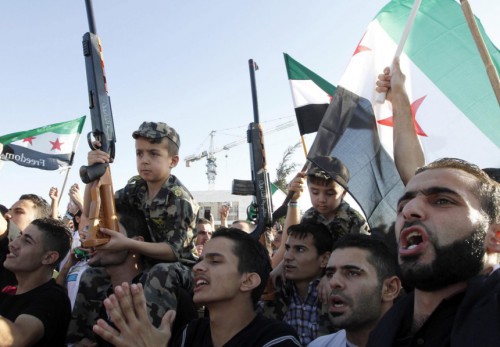
Syrien, Eurasien und die neue multipolare Weltordnung
In Syrien findet ein Weltordnungskrieg statt. Während Medien und Politiker eher verharmlosend vom „Bürger-Krieg“ reden, ist der Konflikt zwischen Regierung und Opposition längst eskaliert. Es ist richtiger Krieg. In ihm geht es um viel mehr als um Syrien. Der Weltordnungskrieg, der in dem Land zwischen Damaskus und Aleppo tobt ist weit komplexer als Revolutionen oder „klassische“, lokale Bürgerkriege, und hat Implikationen auf kontinentaler und sogar globaler Ebene. Eine Studie zum Kampf um die künftige Weltordnung.
Von Roland Christian Hoffmann-Plesch
Ex: http://www.eurasischesmagazin.de
Die Besonderheiten des Syrienkrieges, die einseitigen Presseberichte, die Peinlichkeit und die unverantwortliche Unparteilichkeit der westlichen Politiker, die Massenhinrichtungen und die Brutalität der Kämpfe, die politreligiöse Motivation und vor allem das Leid der Zivilbevölkerung haben mich dazu gebracht, die vorliegende Mini-Studie zu verfassen. Aleppo 2013 erinnert in seiner Ungeheuerlichkeit und Unmenschlichkeit an Stalingrad 1943. Das ganze Syrien ist eigentlich ein Stalingrad. Die Kriegshetze und die Waffenlieferungen gehen aber weiter. Ich glaube, der Syrienkrieg könnte dennoch paradoxerweise den Beginn einer neuen Ordnung in Eurasien einleiten, einer großräumig organisierten multipolaren Ordnung, die genug stabil sein wird, Aggressionen raumfremder, nichteurasischer Mächte abzuwehren und innereurasische Konflikte friedlich zu lösen.
Außerdem bestätigt dieser Krieg meine These, dass das säkular-rationalistische Projekt der Aufklärung eindeutig gescheitert ist, und dass wir heute eine Rückkehr der Religionen bzw. eine Renaissance der politischen Theologien/politischen Religionen erleben. Kurz: wir befinden uns heute (im positiven und im negativen Sinne) in einem neuen Mittelalter. Wenn unsere säkularisierte, entpolitisierte Gesellschaft die religiösen, politreligiösen oder weltanschaulichen Komponenten nichtwestlicher Gesellschaften weiter ignoriert oder falsch deutet, verkennt sie nicht nur die Natur des Menschen, sondern auch die intimsten Mechanismen einer Gemeinschaft bzw. Gesellschaft.
Zur Person: Christian Hoffmann-Plesch
Dipl. Jur., Dipl. sc. pol. Univ. Roland Christian Hoffmann-Plesch, (LL.M.), wurde 1972 geboren. Er absolvierte Studium der Rechtswissenschaften und Politikwissenschaften (Juristische bzw. Sozialwissenschaftliche Fakultät der Ludwig-Maximilians-Universität und Hochschule für Politik München). Außerdem ein Studium der Religionswissenschaft, Ethnologie, Philosophie und Theologie (als Gaststudent in Bukarest, Jassy, München). Seine rechtswissenschaftlichen Fachgebiete und Schwerpunkte sind Strafrecht, Rechtsphilosophie, Kriminologie/Kriminalpsychologie, Rechtsmedizin, Forensische Psychiatrie, Kriminalistik. Die politikwissenschaftlichen Fachgebiete und Schwerpunktesind Politische Theorie, Staats-, Europa- und Völkerrecht, Internationale Politik.
Hoffmann-Plesch ist Magister der Rechte am Institut für die gesamten Strafrechtswissenschaften, Rechtsphilosophie und Rechtsinformatik (LMU München), Doktorand der Rechtswissenschaften (Thema der Dissertation: „Freiheitsrechte, Minimalstaat, polyzentrisches Recht. Eine Abhandlung zur Rechts- und Staatsphilosophie des Libertarismus“). Er war bis 2005 Anwalt für Strafrecht.
Aktuelle Forschungsgebiete sind: Libertaristische Rechts-, Staats- und Straftheorie, Europäische Sicherheits- und Verteidigungspolitik, Politische Theologie, Mittelalterliche Rechts- und Reichsordnung, Multipolare Weltordnung.
„Das Freund-Feind-Denken ist eine anthropologische Konstante der Menschheit“
Der Westen wird in solchen Angelegenheiten wie dem Syrienkrieg, der wahhabitisch-sunnitischen Feindschaft, der Balkanisierung des Nahen Osten usw. auch in der Zukunft falsche Entscheidungen treffen, unnatürliche Allianzen schließen und somit seinen eigenen Untergang bereiten. Das Freund-Feind-Denken ist zwar eine anthropologische Konstante, man sollte es jedoch nicht künstlich ernähren und ebenso nicht mit Gewalt auslöschen wollen. Auch die tiefste Feindschaft ist nicht ewig und mit weisen, politisch-klugen und gerechten Entscheidungen kann man sie beenden.
Die Idee für die vorliegende Studie, die im Juli 2013 ergänzt und aktualisiert wurde, ist entstanden während der Arbeit am Projekt „Freund und Feind in der multipolaren Weltordnung. Eine Abhandlung zur Renaissance der Politischen Theologie“ (Hochschule für Politik/Sozialwissenschaftliche Fakultät München, 2012). Die Hauptthese dieser Untersuchung lautet: „Das Freund-Feind-Denken ist eine anthropologische Konstante der Menschheit und der politisch-theologische Komplex ein fester Bestandteil der Rechts- und Staatsgeschichte. Aus diesem Grund kann die Staatenwelt keine entpolitisierte, abstrakt-universale Einheit sein, sondern sie ist und bleibt, was sie immer war: ein konkretes politisches Pluriversum. Folglich wird jeder Versuch, eine unipolare Weltordnung mittels politischen, wirtschaftlichen oder militärischen Druckes zu errichten, früher oder später scheitern. Nur eine multipolare Weltordnung wird weltweit als realistisch und zugleich effizient empfunden, denn nur eine solche Organisationsform wird den Freiheits-, Gerechtigkeits- und Ordnungsvorstellungen der Mehrheit der Völkerrechtssubjekte entsprechen und somit globale Anerkennung finden.“
Geostrategie und Geopolitik für ein neues amerikanisches Jahrhundert
Die USA hingegen versuchen im 21. Jahrhundert die Rolle einer globalen Ordnungsmacht zu übernehmen und mit allen verfügbaren Mitteln eine imperiale Pax Americana zu schaffen. Dieses Projekt der USA für ein unipolares, amerikanisches Jahrhundert unterscheidet sich dabei unter militärischem Aspekt von der US-Strategie im Kalten Krieg. Einerseits versucht Washington durch Missbrauch des Völkerrechts (etwa durch unilaterale Gewaltanwendung unter dem liberal-demokratischen Mantel des humanitaristischen Interventionismus) Länder, die für sie vom großen Interesse sind, zu sichern (zu „demokratisieren“). Andererseits versucht es die Entstehung neuer Großmachtkonkurrenten in geostrategisch wichtigen Regionen zu verhindern. Die USA sind somit die konsequentesten Verfechter einer neuen Weltordnung mittels Empire-Politik ihres militärisch-industriellen Komplexes. Außer ihnen gibt es heute keine andere Großmacht, die explizit ihre imperiale Mission betont und mit allen verfügbaren Mitteln nach der Weltherrschaft greift.
Schachbrett Eurasien
Viele Kritiker des US-Establishments sehen hinter der amerikanischen Außenpolitik der letzten 20 Jahren oft nur wirtschaftliche Interessen, und betrachten die Aggressionen gegen öl- und gasreiche islamische Länder als Wirtschafts- bzw. Ressourcenkriege oder kurz Raubkriege. Das ist jedoch nur ein Teil der Wahrheit: erstens sind die von den USA erlittenen Kriegsschäden größer als ihr Kriegsgewinn, zweitens ist die wirtschaftliche Suprematie kein Endziel, sondern ähnlich wie die militärische, technologische oder kulturelle Überlegenheit nur Mittel zur Erreichung eines höheren Ziels.
Das wichtigste Ziel der USA ist die Sicherung ihrer globalen Macht. Die Macht ist in diesem Kontext unter zwei Aspekten zu verstehen, nämlich unter geopolitischem und ? was in der Literatur wenig beachtet wird ? unter theopolitischem Aspekt. Einerseits wird sie in einem räumlichen, geografischen Sinne als (militärisch-industrielle) Übermacht gegenüber möglichen Konkurrenten verstanden, nach dem Motto: „Die Grenzen des Planeten sind zugleich die Grenzen des US-Empires“. Das Denken über hegemoniale oder imperiale Vormachtstellung in sicherheitspolitisch-militärischen Kategorien (z.B. als globaler Antiterror-Krieg) hat zwangsläufig zur Renaissance der klassischen Geopolitik bzw. des Geoimperialismus geführt wie die weltweiten amerikanischen Regionalkommandos bezeugen (http://www.defense.gov/ucc/). Andererseits wird die Macht polittheologisch, im Sinne der amerikanischen chiliastisch-messianisch-eschatologischen Vorstellung gedeutet, und zwar als Recht eines von Gott auserwählten Volkes, über die ganze Welt zu herrschen. Nach der Amerikanischen Revolution und der translatio imperii Britannici hat sich bei den Bewohnern der „Neuen Welt“ ein starkes alttestamentarisches und zugleich neoprotestantisches Sendungsbewusstsein entwickelt, das heute in Form von Evangelikalismus und „christlichem Zionismus“ die US-Politik maßgeblich beeinflusst und der ungebrochenen israelisch-amerikanischen Allianz zugrunde liegt.
Die größte Gefahr für die USA kommt heute, laut herrschender Meinung unter Geostrategen und Entscheidungsträgern des US-Establishments, genau wie im 20. Jahrhundert aus Eurasien, das das „Schachbrett“ ist, auf dem der Kampf um globale Vorherrschaft auch in Zukunft ausgetragen wird (Z. Brzezinski, Die einzige Weltmacht, 1997: 57). Das oberste Gebot der US-Geopolitik lautet demnach, so George Friedman, Gründer und Leiter von Stratfor, jede Macht zu bekämpfen, die eine Vorherrschaft über Eurasien erlangen könnte. Das ist der Hauptgrund, weshalb die USA Krieg in dieser Region führen, so dass trotz aller menschenrechtlich-demokratischen Rhetorik, wenig Interesse an Frieden in Eurasien bestehe (G. Friedman, Die nächsten hundert Jahre, 2009: 59ff., 165, 180).
Die USA haben jedoch primär nicht die 1945 besiegten europäischen Zentralmächte oder die EU im Visier, zumindest solange die EU oder ihr deutscher Kern sich nicht zu einer von Amerika unabhängigen Supermacht entwickeln, was sich angesichts der gut geplanten und geführten Operationen der US-Geheimdienste in Europa und vor allem in Deutschland leicht nachweisen lassen würde (siehe den jetzigen NSA-Skandal). Amerika hat ein Interesse an neuen oder wiedererstarkten regionalen Einzelakteuren und Allianzen, die mächtig genug werden können, um die USA militärisch anzugreifen oder ihre politisch-wirtschaftliche Kraft zu schwächen und so ihren Supermachtstatus zu unterminieren. Bekämpfen bedeutet in diesem Kontext nicht, diese Mächte militärisch zu besiegen, sondern ihren Aufstieg zu verhindern, sie zu destabilisieren.
Das erklärt einigermaßen die brutalen, scheinbar irrationalen militärischen Aktionen der USA seit 1990. Es geht nicht um Herstellung von Ordnung, um Stabilisierung der Region ? solche Aufgaben würden die USA ohnehin überfordern ?, auch nicht um militärische Siege, die angesichts der Bedingungen der neuen, asymmetrischen Kriege und der religiösen, jenseitsorientierten Motivation der Gegner nicht mehr möglich sind, sondern um Chaos zu schaffen und die potentielle Gegenmacht zu destabilisieren (G. Friedman, Die nächsten hundert Jahre, 2009: 60f.). In dieser Strategie passt wie gegossen der zivilreligiöse Mythos des weltweiten Terrorismus, den die USA erschaffen haben, um einen permanenten Kriegszustand auf dem gesamten Globus und vor allem in Eurasien zu institutionalisieren. Der sogenannte „Krieg gegen den Terror“ wurde so zu einem säkularisierten Kreuzzug gegen den Islam hochstilisiert, und ist allmählich zum Blankoscheck geworden, auf globaler Ebene militärisch direkt oder indirekt (mittels Verbündeten und Vasallen) zu intervenieren.
Scheinmultilateralismus
Die Entstehung mehrerer regionaler oder globaler Machtpole (Russland, Indien, Iran, China u.a.) ist bereits Wirklichkeit und zugleich eine enorme Herausforderung für die USA, die sich dieser neuen globalen Machtkonstellation mit allen verfügbaren Kräften widersetzen und so den friedlichen Übergang von einer uni- zu einer multipolaren Weltordnung erschweren. Wir erleben heute den wahrscheinlich letzten Versuch des amerikanischen militärisch-industriellen Komplexes, konkurrierende Mächte weltweit auszuschalten, um die Sicherung der globalen Vormachtstellung der USA zu erreichen. Die Interventionen Amerikas (mit oder ohne Hilfe der NATO), sind Teile der amerikanischen Eurasien-Strategie. Sie finden statt in Ländern wie Irak, Jugoslawien, Somalia und Afghanistan. Dazu gehören die ständigen Provokationen gegenüber Russland, Nordkorea oder Pakistan, der Versuch, Europa in „old Europe“ und Neueuropa zu spalten, die osteuropäischen „Orange-Revolutionen“ und der „Arabische Frühling“, sowie nicht zuletzt der (noch) „kalte Krieg“ gegen den Iran, oder die Stellvertreterkriege in Libyen, Syrien, Mali, Sudan usw. Ein wichtiges Element dieser Strategie ist die Multilateralität, die von den USA oft in Anspruch genommen wird, und auch Bestandteil der neuen Doktrin der US Armee ist (http://www.dtic.mil/doctrine/new_pubs/jp1.pdf)
Diese Multilateralität ist eher eine Scheinmultilateralität, denn die Unterstützung der staatlichen und nichtstaatlichen Verbündeten ist kein Selbstzweck, sondern Mittel zum Zweck; kurz: „multilateral, wenn möglich, unilateral, wenn nötig“ (R. Kagan, Macht und Ohnmacht, 2004: 161). Es gibt aber Fälle, wo die USA trotz ihrer Überlegenheit und ihrer Präferenz für unilaterale Lösungen auch andere Mächte und Kräfte auf ihre Seite zu ziehen versuchen, wie die von ihnen geführten Kriege in Eurasien zeigen. Durch Allianzen wie „Anti-Irak-Koalition“ (1991), „Anti-Terror-Koalition“ (2001) oder „Koalition der Willigen“ (2003) haben die USA vor allem versucht, erstens eine imperiale Überdehnung zu vermeiden, zweitens den Gegnern zu zeigen, dass sie für ihre Aktionen eine breite oder gar globale Unterstützung haben und, wo es möglich war, von der UNO legitimiert sind. Drittens dadurch noch mehr Feindschaft und Verwirrung zu stiften, mit schwerwiegenden Konsequenzen, wie die Attentate in Madrid, London, auf Djerba, Bali und anderswo beweisen.
Es gibt auch Fälle, in denen die USA ihre geopolitischen Ziele nicht nur mit Hilfe westlicher Verbündeter, sondern auch durch die Unterstützung bestimmter Kräfte erreichen, die als Feinde Amerikas gelten. Im Libyen-Krieg haben die westlichen Länder trotz ihrer obsessiven Anti-Terror- und Anti-Al-Qaida-Rhetorik entschieden, Al Qaida-Militante in ihrem Kampf gegen den libyschen Machthaber Muammar al-Gaddafi zu unterstützen. Da der neue globale Akteur China, der seine friedliche wirtschaftsimperiale Macht über Afrika ausdehnt, bis zum Ausbruch des Krieges auch in Libyen sehr präsent war, stand Amerika in Verdacht, durch eine scheinbar unvernünftige Libyen-Politik mehrere Ziele auf einmal erreichen zu wollen: Erstens die Vertreibung der chinesischen Firmen aus Libyen und das Stoppen der chinesischen Investitionen in diesem Land, was nach dem Beginn der Krieges auch passiert ist; zweitens die Ausschaltung eines amerika- und israelfeindlichen Staates, (der bis 2006 auf der Liste der Schurkenstaaten gestanden hatte) und somit die Verwirklichung der imperialen geopolitischen und geostrategischen Agenda; drittens die Sicherung des Zugangs zu den libyschen Ölfeldern für US-Konzerne ähnlich wie im Irak.
Aus realistischer Sicht hat Amerika im Fall Libyen doch rational gehandelt, d.h. im eigenen Interesse, und das ist angesichts seiner ungewissen Zukunft als Supermacht nachvollziehbar. China wird seit einigen Jahren als künftige Großmacht und als großer Gegenspieler Amerikas gehandelt. Ebenso wie China können auch Russland, Indien, womöglich die EU, aber auch Regionalmächte wie der Iran (oder eine schiitische Allianz unter Irans Führung), Pakistan, Nordkorea oder gar die Türkei als Störer der geopolitischen Pläne der USA auftreten (einige gelten bereits als solche). Amerika könnte deswegen weiter versuchen, im eigenen Interesse Drittkräfte anzuwerben ? in Mali und Syrien ist das bereits der Fall ?, um unbequeme Länder zu destabilisieren.
Greater Middle East und Syrien
In dieser Divide-et-impera-Logik passt auch das 2003 von Bush-Regierung ins Leben gerufene Projekt eines Greater Middle East (ab 2004 Middle East Partnership Initiative), einem Programm zur Bekämpfung des Terrors und zur Durchsetzung der Freiheit und Demokratie im geopolitischen Großraum von Marokko bis Kasachstan (http://www.jewishvirtuallibrary.org/jsource/History/greaterMEmap.html).
In Wirklichkeit ist Greater Middle East kein neokonservatives Projekt, sondern „imperiale Kontinuität“ (W. Ruf, Der Greater Middle East, in: R. Tuschl, Die Neue Weltordnung in der Krise, 2008: 13ff.). Dadurch versuchen die USA nicht nur sich Zugang zu wichtigen Rohstoffstätten zu verschaffen, sondern auch das „Islamismusproblem“ zu lösen und vor allem die Entstehung einer Ordnungsmacht in diesem Großraum zu verhindern. Mit ihrer Strategie der „kreativen Zerstörung“, der Neutralisierung des Islams durch „Balkanisierung des Mittleren Ostens“ (J. Wagner, Geburtswehen des Mittleren Ostens, 2007: 2f., http://www.imi-online.de/download/IMI-Analyse07-018.pdf) hofft der amerikanische militärisch-industrielle Komplex die strukturelle Machtverteilung so zu ändern, dass die Entstehung einer hegemonialen Großmacht und die Errichtung einer islamischen Großraumordnung (z.B. in Form eines Kalifats oder einer Allianz islamischer Kernstaaten) unmöglich wird; außerdem wird die Stationierung der US-Armee in der Region, so die Rechnung der Geostrategen, alle potenziellen regionalen Mächte abschrecken. Zu diesen Zwecken haben die USA ein Regionalkommando aufgestellt (USCENTCOM), das für den Nahen Osten, Ost-Afrika und Zentral-Asien zuständig ist (http://www.centcom.mil/about-u-s-central-command-centcom).
Wie wichtig diese Region für die US-Pläne ist, zeigt das für Operationen und Management des USCENTCOM erstellte Budget der letzten 3 Jahren (ohne die Finanzierung der Afghanistan-Mission): 2011: 106.631.000 $; 2012: 137.167.000 $ und 2013: 179.266.000 $ (A. Feickert, The Unified Command Plan and Combatant Commands, 2013: 12, http://www.fas.org/sgp/crs/natsec/R42077.pdf).
Die offizielle Mission des USCENTCOM lautet: Zusammen mit nationalen und internationalen Partnern Kooperation zwischen Nationen zu fördern, auf Krisen zu antworten, staatliche und nichtstaatliche Aggressionen zu verhindern oder zu bekämpfen und Entwicklung und Rekonstruktion zu unterstützen, um die Bedingungen für regionale Sicherheit, Stabilität und Wohlstand zu etablieren.
Ein Brennpunkt des Greater Middle East ist Syrien. Das offiziell verkündete Ziel des USCENTCOM ist hier die Verbesserung der regionalen Stabilität und Sicherheit durch die Wiedereingliederung Syriens in den Mainstream der arabischen Welt. Gleichzeitig ist USCENTCOM besorgt wegen der Kontakte, die Syrien mit Iran und proiranischen extremistischen Organisationen (z.B. Hisbollah) unterhält. (http://www.centcom.mil/syria/). Wie der amerikanische Militärspezialist Andrew Feickert in einem Bericht für den US-Kongress schreibt, entwickelt sich der Syrienkrieg zu einem langfristigen, regelrechten Bürgerkrieg, der eine Bedrohung für die regionale Sicherheit und Stabilität sein könnte. Eine militärische Intervention der USCENTCOM, um nationale Interessen der USA in der Region zu schützen, wird nicht mehr ausgeschlossen. (A. Feickert, The Unified Command Plan and Combatant Commands, 2013: 36, http://www.fas.org/sgp/crs/natsec/R42077.pdf).
Dass die USA ein Interesse an Stabilität und Sicherheit in dieser Region hat, ist zu bezweifeln, vor allem wenn man ihr Verhalten gegenüber Syrien beobachtet. Dieses Land ist nach Brzezinskis Definition zwar kein „geostrategischer Akteur“, also ein Staat, der die Kapazität und den nationalen Willen besitzt, über seine Grenzen hinaus (regional oder global) Macht oder Einfluss auszuüben, um den von den USA fixierten geopolitischen status quo zu verändern. Syrien ist jedoch ein „geopolitischer Dreh- und Angelpunkt“, ein Staat, dessen Bedeutung nicht aus seiner Macht und Motivation resultiert, sondern sich eher aus seiner prekären geographischen Lage und aus den Folgen ergibt, die sein Verhalten aufgrund seiner potentiellen Verwundbarkeit bestimmen (Z. Brzezinski, Die einzige Weltmacht, 1997: 66f.). Bereits 2004 wurde in einer von Rand Corporation in Auftrag der US Air Force verfassten Studie gezeigt, dass Syrien eine asymmetrische Bedrohung für Israel darstellt, und militärisch im Stande ist, den jüdischen Staat mit Chemiewaffen und den von Nordkorea, China, Iran und Russland gelieferten Raketen anzugreifen (N. Bensahel/D. Byman, The Future Security Environment in the Middle East, 2004: 183).
Außerdem unterhält Syrien gute Beziehungen zu Russland, China und Iran ? von Amerika als geostrategische Akteure betrachtet ?, aber auch zu schiitischen Organisationen wie Hisbollah (die einzige Armee der Welt, die 2006 der israelischen Armee eine empfindliche Niederlage verpasste). In Syrien leben 500.000 palästinensische Flüchtlinge und auch viele Funktionäre der antiisraelischen PLO, die, wenn das Assad-Regime fiele, ihre sichere Heimstätte und den Schutz der Gastgeber verlieren würden. Auch Syriens Grenze zur Türkei spielt eine sehr wichtige Rolle in der US-Geopolitik: der Fall Syriens würde die Türkei, anders als die türkischen Politiker glauben, destabilisieren (siehe das kurdische Problem oder den Vormarsch der salafistischen Dschihadisten in dieser Region), und so die Entstehung einer neoosmanischen Regionalmacht verhindern. Es gibt auch andere Punkte, die, wie später gezeigt wird, Syrien für bestimmte Groß- oder Regionalmächte so interessant macht.
Ende der unipolaren Weltordnung
Trotz des Optimismus der Geostrategen und Politiker, die in millenaristischer Manier über eine goldene amerikanische Ära sprechen, welche nach dem dritten Weltkrieg (sic!) eintreten wird (G. Friedman, Die nächsten hundert Jahre, 2009: 247-257.), scheint die US-Strategie des unipolaren Moments gescheitert zu sein. Nach dem Zerfall der UdSSR haben die USA ihre Chancen verspielt. Die durch ihre militärischen Abenteuer bzw. Wirtschafts-, Finanz- und Ressourcenpolitik angerichteten Schäden sind so groß, dass es unwahrscheinlich ist, dass die Welt ? mit Ausnahme einiger enger staatlicher und privater, transnationaler Verbündeter ? Amerika als einen freiheitlich-demokratischen, wohlwollenden Welthegemon ansehen wird. Angesichts der neuen globalen Herausforderungen ist ebenso fraglich, ob die USA ? trotz ihrer militärischen Überlegenheit ? in der internationalen Staatenwelt als Weltordnungsmacht gelten kann.
USA - von wohlwollender Welthegemonie zum imperialen Weltordnungskampf
Unter politikwissenschaftlichem Aspekt ist ein Welthegemon ein übermächtiger Staat, der als funktionales Äquivalent zu einer supranationalen Weltautorität verstanden wird. Die hegemoniale Steuerung beruht auf der Annahme, dass globale Befolgung von Normen bzw. Regeln nur durch eine hierarchische Organisationsstruktur mit zentraler Sanktionsinstanz gewährleistet werden kann, die aber keine formelle, mit rechtlicher Autorität ausgestattete Instanz ist, sondern eine informelle, primär machtbasierte Quasi-Hierarchie, die die zwischenstaatliche Anarchie unangetastet lässt. Die hegemoniale Weltordnung ist eine faktische, keine normativ verankerte Ordnung (V. Rittberger/A. Kruck/A. Romund, Grundzüge der Weltpolitik, 2010: 306ff.).
Durch folgende Eigenschaften erlangt der Welthegemon Supermacht-Status, d.h. Überlegenheit im Bereich der militärischen, ökonomischen und kulturell-ideellen Ressourcen, ebenso wie Überlegenheit beim Kapitel Einfluss tatsächlicher Politikergebnisse: Erstens ist er in der Lage, internationale Regeln zu generieren und deren Beachtung durch Androhung von Sanktionen, Gewährung oder Entzug von Wohltaten zu erreichen; zweitens hat er die Fähigkeit zu politischer Steuerung und Problembearbeitung in Übereinstimmung mit den eigenen Präferenzen (unter anderen die eigennützige Schaffung bzw. Förderung von Normen, Regeln und Institutionen, die seine Weltsicht reflektieren; drittens stellt ein sogenannter wohlwollender Hegemon öffentliche Güter nicht nur zum eigenen Nutzen, sondern auch zum Nutzen anderer Staaten bereit, wie z.B. die Gewährleistung eines hohen Maßes an internationaler Finanzstabilität und Finanzliquidität, die Gewährleistung von Sicherheit, humanitäre Hilfe usw. (V. Rittberger/A. Kruck/A. Romund, 2010: 307f.).
Die USA waren ein real existierender Welthegemon, der im Kalten Krieg auch als benevolent hegemon gehandelt hat und nach dem Ende der bipolaren Weltordnung noch einen Supermacht-Status hatte. Allerdings ist ihre globale Vorherrschaft heute relativ, unter anderem, weil immer mehr Akteure unabhängiger von US-amerikanischen hegemonialen Machtstrukturen werden. Außerdem gibt es auch internationale Institutionen, die ohne den Einfluss des US-Welthegemons entstanden oder geplant sind, wie etwa die Eurasische Wirtschaftsgemeinschaft, China-ASEAN-Freihandelszone oder die für 2015 geplante Eurasische Union.
Beim Kapitel Lösung von transsouveränen Problemen stehen die USA nicht gut da ? es besteht die Gefahr der Selbstüberforderung und, wie bereits erwähnt, der imperialen Überdehnung durch Krieg und weltpolizeiliche Aufgaben. Auch wenn sie ein tatsächliches Interesse an globalem Frieden und nicht an alleiniger Weltherrschaft hätten, wären die USA nicht mehr in der Lage, im Alleingang Kriege zu gewinnen, Terrorismus zu verhindern, Bürgerkriegsparteien zu befrieden, transnationale Kriminalität zu bändigen. Für diese Aufgaben brauchen sie immer öfter eine Koalition, private Sicherheitsfirmen, Söldner oder die Hilfe anderer internationaler Akteure. Man beobachtet vor allem nach 2001 auch einen verstärkten chauvinistisch-militaristischen Exzeptionalismus und einen imperialen Egoismus (Stichwort: „nationales Interesse“), die den Status der USA als benevolent hegemon in Frage stellen.
Erwähnenswert sind auch negative Entwicklungen, die bezeugen, dass die USA kein wohlwollender Welthegemon sind: das Ablehnen des Kyoto-Protokolls, die Kampagne gegen die Errichtung des Internationalen Strafgerichtshofs, Aggressionen und Sanktionen gegen arme Länder, Wirtschafts- und Ressourcenkriege, Folter und gezielte Tötungen von (reellen oder potentiellen) Gegnern, Ausspionierung von Partnern, Alliierten und Vasallen. Außerdem hat Amerika einen Postdemokratisierungs- und Oligarchisierungsprozess durchgemacht. Die Legitimation der US-Herrschaft ist problematisch geworden, vor allem weil die Interessen der USA bzw. der gesellschaftlichen Gruppen, die Machtkontrolle ausüben, und die Interessen anderer, wichtiger Welt- oder Regionalakteure selten kongruent sind. Ferner ist insbesondere nach dem 11. September 2001 ein Auseinanderfallen zwischen hegemonialen Entscheidern und den Entscheidungsbetroffenen zu beobachten. Auch werden schwächere Staaten und private Akteure willkürlich ausgegrenzt, was unter dem Aspekt der demokratischen Herrschaftslegitimation eine partizipatorische Lücke verursacht.
Die USA kennzeichnen sich heute durch suboptimale Effektivität, außenpolitische Aggressivität und völkerrechtswidrigen Interventionismus. Sie sind militärisch und wirtschaftlich überfordert, ihre Herrschaftsform kann man nicht mehr als eine klassische freiheitliche Demokratie, sondern als postdemokratische Oligarchie bezeichnen. Somit sind sie heute zu einem Global Empire geworden, zu einer quasiautoritären Macht, die ein imperiales, manichäisches Weltbild verfolgen. Guantanamo, Falludscha und Abu-Ghraib sind nur drei Symbole der gescheiterten US-Politik. (R. Chr. Hoffmann-Plesch, Freund und Feind in der multipolaren Weltordnung, 2012, unveröffentlicht).
Das Projekt für ein neues amerikanisches Jahrhundert hat sich als eine gefährliche Utopie erwiesen. Die USA müssen sich von der Vision einer Pax Americana verabschieden, ihre Außenpolitik ändern und sich zunehmend als Regionalmacht verstehen, andernfalls werden die Folgen ihrer menschenrechts- und völkerrechtswidrigen Handlungen auch in den nächsten Jahrzehnten zum Widerstand gegen und zum Hass auf die USA führen. Stattdessen jedoch halten die USA an ihrem imperialen Projekt fest, sie haben sich von der Vorstellung einer wohlwollenden Welthegemonie verabschiedet und sind in einen nach der klassischen imperialen Strategie geführten Weltordnungskampf gezogen. Dazu gehört es, Absprachen zwischen den Vasallen zu verhindern und ihre Abhängigkeit in Sicherheitsfragen zu bewahren; die tributpflichtigen Staaten fügsam zu halten und zu schützen; dafür zu sorgen, dass Schurkenstaaten sich nicht zusammenschließen (Z. Brzezinski, Die einzige Weltmacht,1997: 66f.). Die heutige Staatenwelt ist aber im Vergleich zur unipolaren Weltordnung komplexer geworden. Wir befinden uns am Anfang einer multipolaren Weltordnung, deren Hauptakteure ? darunter Atommächte ? nicht gerade als Freunde der USA gelten (mit Ausnahme der EU, die sich aber allmählich der Vormundschaft Amerikas zu entziehen versucht), und auch keine wirklichen Demokratien sind.
Multipolarität und Großraumordnung
Die USA, die am Beginn des 21. Jahrhunderts noch als Sieger des Kalten Krieges und als einzig gebliebene Supermacht galten, werden jetzt mit allen Wahrscheinlichkeit den Status als alleinige Weltmacht verlieren und die Macht mit anderen global agierenden Kräften teilen müssen. Die sukzessiven geopolitischen Paradigmenwechsel ? von der Multipolarität der ersten Hälfte des 20. Jahrhundert zur Bipolarität des Kalten Kriegs und weiter zur welthegemonialen Unipolarität nach 1990 ?, haben die Staatenwelt radikal verändert und die Koexistenz von verschiedenen Akteuren, wie Staaten, Großräume, Imperien (das noch handlungsfähige US-Empire oder das sich noch in statu nascendi befindliche chinesische Imperium) wieder ermöglicht. Anders als in einem unipolaren System, das sich durch eine hegemoniale oder imperiale Vormachtstellung eines Staates oder Staatenverbundes kennzeichnet, existieren in einem globalen multipolaren System mehrere politisch gleichgewichtige bzw. gleichberechtigte Zentren. Die heutige Weltordnung ist wieder multipolar ? sie besteht aus mehreren Machtpolen, die zwar militärisch und wirtschaftlich nicht gleich stark oder dem amerikanischen militärisch-industriellen Komplex überlegen sind, aber aus der Sicht der USA die unipolare Ordnung fragmentieren und das „amerikanische Jahrhundert“ destabilisieren. Weil geopolitische Machtverlagerungen in der Geschichte immer von Konflikten begleitet waren und ständig zur Entstehung neuer Freund-Feind-Konstellationen geführt haben, erscheinen die heutigen Stellvertreterkriege oder der „Krieg gegen den Terror“ als „militärisch unterfütterte Geopolitik“ (W. Ruf, Der Greater Middle East, in: R. Tuschl, Die Neue Weltordnung in der Krise, 2008: 23).
Die jetzige Ordnung ist nicht nur eine multipolare, sondern auch eine großräumig organisierte Weltordnung, die allmählich die Gestalt eines globalen Systems von Großraumordnungen annimmt. Trotz der Transnationalisierung bzw. Globalisierung des Völkerrechts, der Säkularisierung und Modernisierung, der Verwirtschaftlichung, Entnationalisierung und Entpolitisierung eines erheblichen Teils der Welt, und entgegen den Anstrengungen der USA scheint dieser Trend jedoch unumkehrbar zu sein. Es scheint, dass die Großraumrevolution, die in Eurasien zu beobachten ist, nicht von universalistischen, westlich-säkularen Werten vorangetrieben wird, sondern von partikularen Sozialethiken bzw. Geostrategien und neo-orthodoxen Glaubensbekenntnissen, die in verschiedenen politisch-religiösen/-theologischen Komplexen wurzeln. Das bedeutet für die säkulare euro-atlantische Elite nicht nur harte Konkurrenz, sondern auch das Ende ihres Traums von der Demokratisierung der Welt nach ihrem Ebenbild.
Angesichts dieser Realitäten scheint das neue Jahrhundert keine Epoche universeller Werte, kein Konzert der Demokratien, sondern eine Ära voller Spannungen und Konfrontationen zu sein. Neben China und dem südostasiatischen Großraum, Indien und dem südasiatischen Großraum, Russland und dem nordeurasischen Großraum und dem europäischen Großraum (EU) gibt es auch einen eher kulturell-religiös, als geographisch oder wirtschaftlich-politisch definierten Großraum. In diesem Raum konkurrieren mehrere innerislamische Kräfte, die sich offen bekriegen und so der einzigen außereurasischen Großmacht Amerika indirekt helfen, ihre imperiale Agenda zu erfüllen.
Zwischen puritanisch-dschihadistischer Weltrevolution und panarabisch-nationalistischer Großraumordnung
Die gegenwärtige weltweite Rückkehr der Religionen und die Wiedergeburt des politreligiösen Denkens sind nicht nur Reaktionen auf Säkularisierung, Modernisierung, Globalisierung und den damit verbundenen Identitätsverlust, sondern auch eine übergeschichtliche Kontinuität. Wie das Beispiel der islamischen Welt zeigt, haben die verschiedenen konfessionellen Strömungen die sukzessiven Wellen von säkularen Ideologien westlicher Prägung überdauert. Diese weltimmanenten universalistischen Kräfte konnten sich (in reiner Form) gegen den geschichtstranszendierenden islamischen „Volksgeist“ nicht durchsetzen und wurden einem schnellen Entartungsprozess ausgesetzt. Ursprüngliche Kräfte, die zur intimsten Struktur der Geschichte gehören, wie gemeindliche, religiöse oder regionale Formen der gesellschaftlichen Organisation gelten als Anzeichen für eine übergeschichtliche Kontinuität (A. Al-Azmeh, Die Islamisierung des Islam, 1996: 35).
Heute betrachten immer mehr arabische und nichtarabische Moslems den Islam als das einzige Antidot gegen den Verfall der umma und als Waffe gegen deren interne, nichtfundamentalistische, meist staatliche bzw. externe, antiislamischen Feinde betrachten. Mittelalterlich anmutende Begriffe wie dschihad, mudchahid, chilaafa, schahid, murtad, kuffar, scharia usw. sind aus der heutigen Alltagssprache der jungen Muslime nicht mehr weg zu denken. Wir erleben jetzt eine islamische Weltrevolution, die sich unter dem Druck und zugleich mit Hilfe des westlichen, vorwiegend amerikanischen militärisch-industriellen Komplexes zu einem globalen Dschihad entwickelt hat. Wie das Beispiel des heutigen Syriens zeigt, ist die muslimische Welt polarisiert. Sie bewegt sich zwischen verschiedenen, teilweise gegensätzlichen Ordnungsvorstellungen, die von einem puritanisch-wahhabitischen Kalifat bis zum klassischen national-arabischen Staat und weiter zum westlich orientierten säkularen Staat und zu einer christlich-islamischen, im „sakralen eurasischen Imperium“ (A. Höllwerth, Das sakrale eurasische Imperium des Aleksander Dugin, 2007) eingegliederten Großraumordnung reicht. Eine entscheidende Rolle bei der von Innen- und Außenfaktoren vorangetriebenen Neu- oder je nachdem Unordnung der islamischen Welt spielt die Scharia, das einzige Rechtsystem im Islam, das von puritanisch-konservativen Kräften anerkannt wird.
Islamische Rechtstheologie
Die seit den 1970er Jahren verstärkten „Re-Islamisierung“ der islamischen Länder war nicht nur ein politreligiösen, sondern auch ein rechtspolitisches bzw. rechtstheologisches Problem. Der Versuch, westliche politische Systeme zu übernehmen, wurde im Islam vom Versuch, westliche Rechtsauffassungen und Rechtssysteme zu übernehmen, begleitet. Beide Versuche sind gescheitert, weil die pro-westlichen Kräfte keine Rücksicht auf die eigene islamische Tradition und Mentalität genommen haben. Die westlichen Ideologien wurden nach dem Ende des Kolonialismus von der Mehrheit der Moslems als unislamisch bezeichnet. Die Vorstellungen von Demokratie und Menschenrechten stellen auch heute nach Ansicht der führenden Islamisten eine „bösartige Ideologie“ dar, eine „neue säkulare Religion“, die nun vom Neo-Kolonialismus unter der US-Führung propagiert wird (A. Al-Azmeh, Die Islamisierung des Islam, 1996: 171).
Ein wichtiger innerislamischer Streitpunkt ist die Scharia. Die primären Quellen dieses Rechtssystems sind der dem Propheten Mohammed offenbarte Koran und die Sunna, die Summe der gesetzlich verbindlichen Äußerungen, Handlungen und Bestätigungen Mohammeds. Das Recht der urislamischen Gemeinschaft war allerdings unsystematisch und heterogen. Es gab keine Scharia im späteren Sinne und deshalb keine kohärente islamische Rechtsordnung. Neben allgemeinen koranischen Richtlinien und zum Teil konkreten ad-hoc-Regelungen gab es auch vorislamische Regeln des Zusammenlebens. Allmählich hat sich die Auffassung etabliert, dass ein Rechtssystem sich nicht auf Rechtsnormen und -entscheidungen stützen sollte, die aus vorislamischen Traditionen und pragmatischen Überlegungen hergeleitet werden, sondern dass sie ausschließlich auf der Religion des Islams zu fußen habe.
So wurden der Koran und die Sunna zu Kriterien der Rechtsschöpfung. Kurze Zeit später wurden auch der Analogieschluss und der consensus prudentium als sekundäre Rechtsquellen akzeptiert, diese kommen aber nur in bestimmten Fällen zum Einsatz, die im Koran und in der Sunna nicht behandelt werden, und sie sind nur im Geiste des Korans und der Sunna anzuwenden) (A. Noth, Die Scharia, das religiöse Gesetz des Islam, in: W. Fikentscher/H. Franke/O. Köhler, Entstehung und Wandel rechtlicher Traditionen, 1980: 416ff.).
Die verschiedenen islamischen Rechtsschulen entstanden später aus mindestens zwei Gründen. Erstens wurde der Islam während seiner Ausbreitung über andere Völker und Länder mit fremden Lebensformen konfrontiert. Da ein wahrer Muslim erstens nicht nur verbal bezeugen muss, dass es keinen Gott außer Allah gibt und Mohammed sein Gesandter ist, sondern auch im Einklang mit dem Koran und der Sunna leben sollte, hat der Islam versucht, eine Antwort auf die verschiedenen Traditionen, Gesellschaftsformen und Rechtssysteme der neu islamisierten Völker zu finden. Zweitens war die Scharia keine Schöpfung einer gesetzgeberischen islamischen Herrscherschicht; Grundlegung, Ausgestaltung und Bewahrung der Scharia lagen in den Händen von Privatleuten, die in Abwesenheit einer hohen weisungsgebenden Autorität trotz prinzipieller Übereinstimmung verschiedene juristische Auffassungen vertraten. Aus einer praktischen Notwendigkeit und wegen Meinungsverschiedenheiten entstanden verschiedene islamische Rechtsschulen, die anders als im säkularen Westen keine abstrakte Rechtssysteme, sondern auf konkreten, gesellschaftlich verankerten Praktiken beruhende Lebensformen waren. Somit wurde der Islam wie eine „Gesetzesreligion“ strukturiert. Aus diesem Grunde entstand eine andere, nicht-juristische Strömung, nämlich die islamische Mystik. Die Mystiker haben sich zwar nie völlig außerhalb der Scharia bewegt, aber sie haben die Auffassung vertreten, dass die äußere juristische Form der Religion und des gesellschaftlichen Lebens nicht genügt, den Menschen Gott nahe zu bringen. Man brauche auch eine innerliche und innige Annäherung, die zusammen mit der Besinnung auf koranische Frömmigkeit und der islamischen Rechtstheologie die Grundlagen der islamischen Mystik stellen. (A. Falaturi, Die Scharia ? das islamische Rechtssystem, in: Bayerische Landeszentrale für politische Bildungsarbeit, Weltmacht Islam, 1988: 97f.)
Sunniten vs. Schiiten
Die Unstimmigkeiten zwischen „Mystikern“ bzw. gemäßigten Moslems und „Legalisten“ und die Unterschiede zwischen verschiedenen Rechtsschulen sind bis heute spürbar. Vor allem zwei islamische Rechtschulen sind für die heutigen Umwälzungen im Islam und ganz besonders in Syrien wichtig. Die erste, die nach Ahmad ibn Hanbal (780-855) genannte Schule der Hanbaliten, war eine sunnitische, konservativ-dogmatische Reaktion auf rationalistische Tendenzen in der islamischen Gesellschaft. Für Hanbaliten gelten nur die Traditionen des Propheten und der ersten Prophetengefährten und keine anderen Rechtsmittel (später wurde jedoch auch der „richtige Analogieschluss“ angewandt). Die Zustimmung zur Vergangenheit und die Idealisierung der urislamischen Gemeinschaft spielen eine große Rolle, moralisches, privates Urteilen hat viel mehr Gewicht als theologische und juristische Kontroversen und Problemlösungen. Die Hanbaliten streben die Fortführung des Anstrengung (idschtihad), alle Gesetze aus dem Koran, der Sunna und dem Konsens der ersten Generationen ? der ehrwürdigen, rechtschaffenen Vorfahren (salaf as salih) ? abzuleiten und, wenn nötig, neu zu interpretieren (selbstverständlich nur im Geiste des Koran und der Sunna).
Aus dieser dogmatisch-konservativen Rechtsschule entstanden später pietistische Strömungen wie die Muslimbrüder oder die islamischen Revolutionäre. Eine radikale Richtung ist der Wahhabismus, der auf der Lehre von Muhammad ibn Abd al-Wahhab (1703-1792) gründet und die Rückkehr zum reinen Islam der Urgemeinschaft des 7 Jahrhundert fordert, in der Allahs Alleinherrschaft entscheidend war. Nach der wahhabitischen Lehre dürfen die Muslime den Propheten nicht anbeten oder vor dem Schrein der Heiligen beten, sie dürfen auch den Kult der heiligen Gräber nicht pflegen. Es gilt die strikte Einhaltung der Scharia und alle nichtsunnitischen (etwa Schiiten, Sufis, Alawiten) und gemäßigte sunnitische Muslime sind als Häretiker und Apostaten zu behandeln. Die Lehre dieser Sekte ist in Saudi-Arabien Staatsdoktrin und zugleich Wegweiser für Millionen Muslime weltweit, die unter dem Namen „Salafisten“ eine umstrittene, aber wichtige Rolle in den heutigen Auseinandersetzungen im Islam und vor allem in Great Middle East spielen.
Die zweite, für den heutigen Islam wichtige Rechtsschule ist die der Schia, die Schule der Muslime, die den Imamen folgen, die aus der Familie des Propheten stammen. Anders als die Sunniten glauben die Anhänger des Vetters und Schwiegersohns Mohammeds, Ali ibn Abi Talib, dass dieser der rechtmäßige Nachfolger des Propheten war. In der schiitischen Imamatstheorie werden der Koran und die Sunna als Rechtsquellen anerkannt, den Konsensus der Gelehrten wird aber durch den Entscheid des „unfehlbaren Imams“ ersetzt. Nach seinem Verschwinden lebt der 12. Imam Muhammad ibn Hasan al-Mahdi in der Verborgenheit und wird vor dem Ende der Welt erscheinen. Anstelle der sekundären Rechtsquellen hat diese Schule die Vernunft als Rechtsmittel aufgestellt. Außerdem sind in die schiitische Strömung mehrere fremde Vorstellungen, darunter altpersische und gnostische Elemente, eingeflossen. Das hat die Feindschaft der Sunniten, insbesondere der Wahhabiten zugezogen; die sunnitischen Theologen bezeichnen die Schiiten (ebenso die Alawiten, die im Syrien an der Macht sind) als unislamisch, ungläubig oder heidnisch. Die Schule spielt jedoch eine wichtige Rolle in Iran, wo sie die Grundlagen der Theokratie stellt, in Irak, Libanon, Syrien usw.
Politreligion, Sektarismus, die Wirkung der Scharia: Der Fall Syrien
Zwischen diesen zwei großen, sich im Konflikt befindlichen Strömungen des Islams haben Millionen Alawiten, Drusen, Kurden, Sufis, Christen, moderate Sunniten und Angehörige anderer Glaubensrichtungen versucht, ein friedliches Miteinander zu schaffen. In Syrien etwa war das aufgrund einer von Staat und Partei vertretenen quasisäkularen, auf christlich-islamische und multiethnische Koexistenz fixierte Politreligion möglich, allerdings unter dem Druck einer autokratischen, nationalen und sozialistischen Staatsordnung, die jede rein religiöse und ethnische Partei verbot. Hafiz al-Assad ? Baschars Vater und Präsident bis 2000 ?, hat Syrien fast 30 Jahre mit eiserner Hand regiert und aus einem chronisch instabilen Land ein „Bollwerk der Stabilität“ (N. Bensahel/D. Byman, The Future Security Environment in the Middle East, 2004: 177) gemacht. Der Preis dafür war jedoch groß: Repression, Vetternwirtschaft, die Macht in der Hand der autoritären Baath-Partei und der mit ihr verbündeten Kleinparteien, die Vorherrschaft der alawitischen Minderheit über die sunnitische Mehrheit usw. Im Zuge des sogenannten „Arabischen Frühlings“ kam es ab März 2011 zu Protesten gegen die Assad- Regierung, die sich im Laufe der Monate zu einem regelrechten Krieg entwickelten, der aber mehr nach Stellvertreter- als nach Bürgerkrieg aussah und später gar zur einer leisen, von außen gesteuerten Invasion raumfremder Kräfte geworden ist. Die Kritiker der Assad-Regierung, die einen friedlichen Übergang zu einer freiheitlich-demokratischen Ordnung anstrebten, wurden relativ schnell von bewaffneten inländischen Oppositionellen und ausländischen, meist salafistischen Dschihadisten verdrängt. Obwohl die Anti-Assad-Opposition ein breites Spektrum aufweist ? darunter der Syrische Nationalrat (SNC), das Nationale Koordinierungskomitee für Demokratischen Wandel (NCC), die Freie Syrische Armee (FSA), die Lokalen Koordinierungskomitees (LCC), der Rat für die Syrische Revolution, die Syrische Beobachtungsstelle für Menschenrechte, Al Kaida/Al-Nusra-Front und „freischaffende Kämpfer“, Syrische Muslimbruderschaft usw. ? kann man leicht feststellen, dass die (sichtbaren) Hauptakteure der Opposition die Kämpfer der FSA und die Dschihadisten sind.
Die post-koloniale Gruppierung der Nationalstaaten in der Region des Nahen Osten wurde als ein „regionales Subsystem innerhalb der Weltordnung“ gedeutet (B. Tibi, Krieg der Zivilisationen, 1995: 89). Man kann weiter gehen, und dieses Subsystem, ob in panarabischer oder in lokalnationaler bzw. sozial-nationaler Gestalt, als eine rudimentäre, aber für kurze Zeit vielversprechende regionale Ordnung bezeichnen, die auf dem guten Weg zu einer stabilen, unabhängigen oder im Sinne Carl Schmitts „völkerrechtlichen Großraumordnung mit Interventionsverbot für raumfremde Mächte" war. Der Traum aller panarabischen, lokalnationalen und sozialistischen Militanten von einer starken überkonfessionellen arabischen Einheit im Großraum Naher Osten ist durch die chaotischen Ereignisse in Libanon, Irak, Ägypten, Palästina und heute Syrien ferner gerückt. Die Bevölkerung dieser Region befindet sich heute, wenn man das aktuelle Beispiel Syriens betrachtet, zwischen einem politreligiösem Abwehrkampf, der von überwiegend nichtfundamentalistischen nationalen, teilweise auch sozialistischen bzw. moderat-islamischen Kräften organisiert wird und einem großräumig ausgedehnten gesetzesreligiösen Dschihad, der von verschiedenen radikalen Gruppierungen militärisch geführt wird.
Auf der Seite der Anhänger der quasisäkularen, national-etatistisch orientierten Politreligion kämpfen direkt oder indirekt einige eurasische Verbündete Syriens, wie Russland, Iran, Hisbollah/Libanon, China und Kräfte aus dem Irak; auf der Seite der Anti-Assad-Opposition kämpfen neben syrischen Oppositionellen schariagläubige Dschihadisten, „Gotteskrieger“ aus afrikanischen, arabischen, kaukasischen, westeuropäischen Ländern und neuerlich aus Pakistan und Afghanistan. Sie werden hauptsächlich von salafistisch-wahhabitischen Kräften finanziert und in den Kampf gehetzt. All das mit großzügiger moralischer, politischer und logistischer Unterstützung euro-atlantischer Akteure, die ohne Rücksicht auf Verluste die Balkanisierung des islamischen Großraums zu beschleunigen versuchen. Die oppositionelle bzw. sektiererische Gewalt und die staatliche Antwort auf diese haben bis jetzt mehr als 100.000 Menschenleben gefordert und Syrien in eine Trümmerlandschaft verwandelt.
Abgesehen von Interessen fremder, nichtislamischer Mächte in Syrien und in Great Middle East muss man an dieser Stelle erwähnen, dass der innerislamische Konflikt ohne den Scharia-Streit zwischen den gemäßigten und den radikalen Moslems die jetzige Intensität nicht erreichen hätte können. Aber die Wirkung der Scharia in der islamischen Geschichte ist weit über die konkrete Anwendung hinausgegangen. Erstens ist sie genau wie seine Vertreter (Privatakteure, keine Herrscher) unabhängig geblieben und den historischen Ereignissen nicht angepasst; sie wurde immer als der „Codex der islamischen Idealforderungen“ verstanden. Zweitens war die Scharia auch unter „quantitativem“ Aspekt wirkungsvoll, wie die Ausdehnung ihrer Kompetenz auf alle Bereiche menschlichen Handelns beweist. Drittens kann man die „(Re-)Aktivierbarkeit“ der Scharia als Wirkungsmöglichkeit nennen, die aufgrund des idealen Charakters dieses Gesetzes zeit- und ortsunabhängig gefordert werden kann. (A. Noth, Die Scharia, das religiöse Gesetz des Islam, in: W. Fikentscher/H. Franke/O. Köhler, Entstehung und Wandel rechtlicher Traditionen, 1980: 432ff.) Man kann folglich die buchstabengetreue Umsetzung der Scharia und somit auch die gesetzesreligiöse Forderung des Dschihad zum Programm von konservativ-dogmatischen Bewegungen machen, was spätestens seit dem Afghanistankrieg (2001) bzw. dem Irakkrieg (2003) und verstärkt heute in Syrien zu beobachten ist.
Was Syrien betrifft, kann man sagen, dass mit der endgültigen Machtergreifung der alawitischen Minderheit (1970) der Konflikt mit den Sunniten, und vor allem mit den Wahhabiten vorprogrammiert war. Diese konnten sich nach 1970 auf eine mittelalterliche fatwa des sunnitischen Rechtsgelehrten Ibn Taymiyya ? Begründer der „politischen Theologie des muslimischen Bürgerkrieges“ (D. Diner, Politische Theorie des Bürgerkrieges, in: J. Taubes, Religionstheorie und Politische Theologie 3, 1987: 238) ? berufen. Dieser gemäß verdienen die syrischen Alawiten als Abtrünnige exkommuniziert, gemäß der Scharia die Todesstrafe. Für Ibn Taymiyya waren sie aufgrund ihrer esoterischen, schiitisch-sufischen Religion und der allegorischen Auslegung der Scharia „schlimmer als Juden, Christen und Heiden“. Außerdem wurden sie aufgrund ihrer Kollaboration mit den Kreuzrittern und der Ablehnung der ersten drei Kalifen als Verräter angesehen.
Nationalstaat oder supranationales Kalifat?
In einer Ramadan-Botschaft des zentralen Medienbüros von Hizb-ut-Tahrir (die international agierende schariagläubige „Partei der Befreiung“) wird am 09.07.2013 verlautbart: „Möge Allah in diesem Monat der Monate die Unrechtherrschaft Assads und seinesgleichen zu Grunde richten und an ihrer statt das Kalifat errichten, auf dass das Licht des Islam erneut die Welt erstrahlen lässt. Amin!“ (http://www.kalifat.com/). Das ist keine bloße Rhetorik, sondern ein Beispiel für die gegenwärtige Renaissance der mittelalterlichen Kalifat-Vorstellung, die vor allem von puritanischen Sunniten wieder aktiviert wird. Die heutigen Konflikte im Islam haben nicht nur mit Glauben, politreligiösen Überzeugungen oder Sektarismus zu tun, sondern auch mit konkret-politischen Ordnungsvorstellungen. Die islamische Geschichte zeigt, dass die „Wir-Gruppen“ im Islam ihre Identität nicht an die Existenz eines über ihnen stehenden Nationalstaats, sondern an ethnischen (z.B. die Kurden in Syrien, der Türkei, im Iran und Irak) oder sektiererischen (z.B. die Schiiten im Iran, Irak, Libanon) Partikularitäten binden.
Die islamistische Erhebung richtet sich nicht nur gegen Feinde und Abtrünnige des Islams, sondern auch gegen den arabischen Nationalstaat als eine Institution, die nicht auf dem islamischen Boden gewachsen, sondern unter der Parole „Vom Gottesreich zum Nationalstaat“ aus dem Ausland importiert wurde. (B. Tibi, Krieg der Zivilisationen 1995: 72ff., 83). Die heutigen islamischen Fundamentalisten wollen diesen Prozess umkehren, die Parole lautet jetzt: „Vom Nationalstaat zum Kalifat“. Was in Syrien passiert hat also auch mit der Ablehnung säkularer, gemäßigt islamischer oder als unislamisch bezeichneter Ideologien sowie Staats- bzw. Lebensformen zu tun. Der Aufstieg der Alawiten im Militärapparat und in der Politik stellte für sunnitischen Pietisten „die höchstmögliche negative Steigerung des sakral verworfenen Zusammenhangs der Barbarei“ dar, ein „Amalgam von arabischem Nationalismus, Militärherrschaft und Säkularismus“, all dies eingebunden in einer „apostatischen ethnischen Minderheitenherrschaft“ (D. Diner, Politische Theorie des Bürgerkrieges, in: J. Taubes, Religionstheorie und Politische Theologie 3, 1987: 241). Der Idee des Nationalstaates bzw. der panarabischen Großraumordnung wird heute die Vorstellung eines supranationalen Kalifats und einer fundamentalistischen Großraumordnung mit Interventionsverbot für schariafeindliche bzw. -ignorante Mächte entgegengesetzt.
Der Islamismus ist zwar auch ohne liberale, nationalistische und sozialistische Komponenten staatskonstitutiv, wie der Iran beweist, die frommen Schariagläubigen jedoch lehnen die Idee des Staates als eine westliche Institution ab und verstehen die Gründung eines panislamischen Kalifats als heilige Pflicht. Anhand des Falls Syrien, der mittlerweile als Schulbeispiel gelten könnte, kann man die drei Merkmale des sunnitisch-fundamentalistischen Dschihadismus erkennen, die an die Merkmale der Globalisierung ? Multikulturalität, Transnationalisierung, Entterritorialisierung ? erinnern, und die dschihadistische Strömung als eine für das 21. Jahrhundert taugliche Weltanschauung erscheinen lassen: seine „multikulturelle Verfasstheit“, seine „transnationale Organisierung“ und seine „entterritoriale Gemeinschaftsvorstellung“ (S. Huhnholz, Dschihadistische Raumpraxis, 2010: 113).
Der Syrienkrieg als Weltordnungskrieg
Teil 2 der Analyse "Syrien, Eurasien und die neue multipolare Weltordnung"
Von Roland Christian Hoffmann-Plesch
Zurück zu Syrien: Warum ist gerade dieses Land so umkämpft? Warum ist Syrien sowohl für nichtislamische als auch für radikalislamische Kräfte so wichtig?
Syrienkrieg als Weltordnungskrieg
Mairead Maguire, nordirische Friedensnobelpreisträgerin (1976), hat als Leiterin einer Friedensdelegation Libanon und Syrien (1.-11. Mai 2013) auf Einladung der „Musalaha Versöhnungs-Bewegung“ besucht. Gestützt auf viele autorisierte Berichte und eigene Untersuchungen stellte sie fest, dass in Syrien kein herkömmlicher Bürgerkrieg, sondern ein Stellvertreterkrieg mit schwerwiegenden Verletzungen des internationalen Rechts und des humanitären Völkerrechts stattfindet. Dieser Krieg wird im Auftrag fremder Mächte geführt, die zur Erreichung eigener Ziele ungefähr 50.000 ausländische dschihadistische Kämpfer trainieren und finanzieren: „Diese Todesschwadronen zerstören systematisch die staatliche Infrastruktur Syriens (Elektrizitäts-, Öl-, Gas- und Wasserwerke, Hochspannungsmasten, Krankenhäuser, Schulen, öffentliche Gebäude, historische Kulturstätten und sogar religiöse Gebäude). Darüber hinaus ist das Land überschwemmt mit Heckenschützen, Bombenlegern, Agitatoren, Banditen. Sie operieren mit Aggressionen und Geboten der Scharia und berauben so die syrische Bevölkerung ihrer Freiheit und Würde. Sie foltern und töten diejenigen, die sich weigern, sich ihnen anzuschließen. Sie haben eigenartige religiöse Überzeugungen, die ihnen ein gutes Gewissen selbst beim Begehen grausamster Taten, wie dem Töten und Foltern ihrer Gegner belassen. Es ist gut dokumentiert, dass viele dieser Terroristen ständig unter einem Aufputschmittel wie Captagon stehen. Das allgemeine Fehlen von Sicherheit zeitigt das schreckliche Phänomen der Entführungen für ein Lösegeld oder zum Erzeugen politischen Drucks.“ (M. Maguire, In Syrien findet ein Stellvertreterkrieg im Auftrag fremder Mächte statt, 2013, http://www.ag-friedensforschung.de/regionen/Syrien/maguire.html)
Der Syrienkrieg ist wahrlich kein klassischer Bürgerkrieg, sondern vielleicht ein für die Zukunft Eurasiens entscheidender Weltordnungskrieg, in dem Mächte und Kräfte kämpfen, die unterschiedliche geopolitische bzw. geostrategische und wirtschaftliche Interesse und zum Teil völlig entgegengesetzte religiöse und weltanschauliche Überzeugungen haben.
Geostrategischer Krieg
Der Krieg wird so radikal geführt, dass er bereits als totaler Krieg gelten kann. Die ausländischen Dschihadisten werden durch einige mächtige Staaten geschützt, was ihnen einen hohen Grad an Verantwortungslosigkeit gewährt, die sie ungestraft zu abscheulichen Grausamkeiten gegen unschuldige Zivilisten ermutigt. Wie Mairead Maguire zeigt, wird selbst das Kriegsrecht nicht respektiert, sodass viele Kriegsverbrechen und Verbrechen gegen die Menschlichkeit begangen werden (M. Maguire, In Syrien findet ein Stellvertreterkrieg im Auftrag fremder Mächte statt, 2013, http://www.ag-friedensforschung.de/regionen/Syrien/maguire.html).
Warum sind euro-atlantische Akteure so sehr an Syrien interessiert? Wie oben erwähnt ist Syrien kein geostrategischer Akteur, der den von den USA fixierten geopolitischen Status quo verändern kann, sondern ein geopolitischer Dreh- und Angelpunkt, ein Staat, dessen Bedeutung sich aus seiner geographischen Lage ergibt. Laut US-General Wesley Clark gab es bereits im November 2001 einen Plan für eine Fünf-Jahres-Kampagne gegen sieben islamische Länder: Irak, Libanon, Libyen, Iran, Somalia, Sudan und Syrien (M. Chossudovsky, Ein „humanitärer“ Krieg gegen Syrien?, 2011, http://www.globalresearch.ca/ein-humanit-rer-krieg-gegen-syrien/26944). Auch der französische Ex-Außenminister Roland Duma bestätigt die Information, dass der Syrienkrieg lange geplant war (http://www.globalresearch.ca/former-french-foreign-minister-roland-dumas-west-was-preparing-attack-on-syria-before-crisis-started/5341296). Es gibt mindestens vier Gründe, die für den Syrienkrieg als geostrategischem Krieg sprechen:
Erstens die geographische Lage: Syrien liegt in der „heißen“ Mitte des Greater Middle East und hat Grenzen mit Libanon, Jordanien, Israel, Türkei, Irak und auch Zugang zum Mittelmeer. Es ist somit der ideale Platz für geopolitische „Schachbewegungen“ und geostrategischen Konfrontationen. Wer Syrien kontrolliert hat eine direkte Grenze zu Israel. Wenn die Kontrolle von einer israelfeindlichen Macht ausgeübt wird, ist die Sicherheit Israels in Gefahr. Wenn im Gegenteil eine israelfreundliche Macht die Kontrolle über Syrien übernimmt, dann ist ein Teil der israelischen Grenze geschützt, Libanon wird isoliert und die Verbindung zwischen Hisbollah und Iran unterbrochen. Wenn diese Macht auch ein euro-atlantisches Nato-Mitglied ist, dann wird Syrien zusammen mit dem Nato-Land Türkei und dem Nicht-Nato-Verbündeten Jordanien einen Sicherheitsgürtel um Israel (das einzige im westlichen Sinne demokratische Land in der Region) bilden und zugleich die russisch-chinesisch-iranische Präsenz in der Region minimieren. Nur die Grenze zu Ägypten würde weiter eine Gefahr darstellen, zumindest solange in Kairo keine israelfreundliche Macht herrscht.
Zweitens die israelfeindliche Einstellung und das asymmetrische militärische Potential: Als Folge seiner geographischen Lage und der klaren antiisraelischen Orientierung seiner jetzigen Regierung gilt Syrien als gefährlich. In der Resolution des US-Repräsentantenhauses zur Verantwortung Syriens für die Wiederherstellung der Souveränität des Libanons aus dem Jahr 2003 (http://www.govtrack.us/congress/bills/108/hr1828/text) wird behauptet, dass Syrien passiv oder aktiv in Verübung von Terrorakten involviert ist, sicheren Hafen für mehrere terroristische Gruppen bietet und mit Hilfe Irans Unterstützung für Terrororganisationen leistet (Hisbollah, Hamas, Islamischer Dschihad in Palästina, Volksfront zur Befreiung Palästinas samt Hauptquartier) (Sektion 2: 1-5). Außerdem werden hier auch die ständigen Raketenangriffe erwähnt, die Hisbollah mit Hilfe Syriens und Irans auf Israel verübt (Sektion 2: 12, 14, 15), und die chemischen, biologischen und ballistischen Waffen, die einem asymmetrischen Krieg gegen Israel dienen könnten, sowie die russisch-syrische Zusammenarbeit auf dem Gebiet der zivilen und vermutlich militärischen Nukleartechnik (Sektion 2: 16-24). Nicht zuletzt wird auch die syrische Unterstützung der antiamerikanischen Rebellen, die im Irak Wiederstand leisten, betont. (Sektion 2: 30-34). Syrien soll unter anderem aufhören, sein Militärarsenal zu erweitern und antiisraelische Terrororganisationen und Rebellen, die im Irak US-Soldaten töten, zu unterstützen (Sektion 5: (d) 1, 3, 4).
Drittens die Bildung gefährlicher Allianzen: Syrien hat sehr gute Beziehungen mit drei mächtigen eurasischen Akteuren ? Russland, China, Iran ? die besondere geopolitische und geostrategische bzw. wirtschaftliche Interessen in der Region haben und somit an der Erhaltung des jetzigen status quo in Syrien interessiert sind. Russland hat im Nordwesten von Syrien, in Tartus, einen Stützpunkt, der zu einer dauerhaften russischen Marinebasis für nuklear bewaffnete Kriegsschiffe umgebaut wurde (aufgrund der Kämpfe vorübergehend geräumt). Die militärisch-technologische Kooperation mit dem Assad-Regime macht aus Syrien Russlands Brückenkopf und Bollwerk im Nahen Osten, wo Russland und seine eurasischen Geostrategen/-politiker mit Hilfe Chinas und in Absprache mit dem Iran als Ordnungsmacht aufzutreten versucht. Russland schützt Syrien, und man kann sagen, der Kreml bestimmt in diesem Moment das diplomatische Geschehen und zusammen mit der Hisbollah und dem Iran auch den militärischen Kampf um Syrien. Syrien scheint für diese eurasischen Mächte die eigentliche rote Linie zu sein. China unterstützt den syrischen Abwehrkampf nicht nur aus weltanschaulichen, wirtschaftlichen oder geostrategischen, sondern auch aus pragmatisch-innenpolitischen Gründen: China wirft den muslimischen Uiguren terroristische Verbindungen nach Syrien vor, wo sie als Mitglieder der Ostturkestanischen Muslimischen Bewegung auf der Seite der sunnitischen Fundamentalisten kämpfen. Diese Kämpfer, so die offizielle Begründung, seien eine große Gefahr für die Integrität und Sicherheit des chinesischen Staates. Über die geostrategische Bedeutung der syrisch-iranischen Allianz genügt hier nur einen Satz: Der Weg der US-Armee, der Nato und der israelischen Zva haHagana nach Iran führt durch Syrien.
Viertens die Eurasien-Strategie der USA: Wie oben erwähnt, versuchen die USA starke eurasische Regionalmächte (Einzelakteure oder Bündnisse) direkt oder indirekt zu destabilisieren, damit sie nicht genug stark werden können, um ihren Supermachtstatus zu unterminieren.
Weltanschauungskrieg
Der Syrienkrieg ist auch ein Weltanschauungskrieg, auch wenn in der westlichen Presse und den außenpolitischen Statements der euro-atlantischen Regierungen darüber nichts zu hören ist. Auch die Strategen der USCENTCOM glauben, dass die Gründe für Syriens innen- und außenpolitische Aktionen anders als im Falle Irans eher aus kurzsichtigen Berechnungen als aus einer tief verankerten Ideologie stammen (http://www.centcom.mil/syria/).
Das entspricht nicht der Realität, sondern ist ein Versuch, die Ursprünge des Konflikts zu verschleiern, Assad als machtgierigen Diktator und die pro-syrischen Kräfte als fanatische Unterstützer des Staatsterrorismus darzustellen. Dass Assad kein Demokrat ist, ist klar. Die Wirklichkeit sieht aber ein bisschen anders aus. Nach dem Untergang des Osmanischen Reiches intensivieren sich in Syrien wie auch in anderen Provinzen des besiegten Reiches panarabisch-nationalistische Bestrebungen zu Unabhängigkeit und Selbstbestimmung. Panarabismus, der unter anderem eine Reaktion auf den jungtürkischen Panturanismus war, gewinnt immer mehr Anhänger. Die Herausbildung politischer Identitäten in dieser Epoche erfolgte im Spannungsfeld panarabischer und territorial orientierter, syrischer bzw. libanesischer Loyalitäten sowie arabisch-islamischer Strömungen, die sich entgegen der Meinung der heutigen Salafisten einander im Einzelfall nicht unbedingt ausschließen. Zum Beispiel sah der Großmufti von Jerusalem große Ähnlichkeiten zwischen den Grundsätzen des Islams und denen des Nationalsozialismus: Bejahung des Kampfes und der Gemeinschaft, das Führerprinzip und der Ordnungsgedanke, die hohe Wertung der Arbeit. A. El-Husseini, Rede an die 13. Freiwilligen Gebirgsdivision der Waffen SS „Handschar“, Junges Forum 3, 2004: 46).
1920 beschlossen die alliierten Siegermächte des Ersten Weltkrieges mit Billigung des Völkerbundes die Neuaufteilung des besiegten Osmanischen Reichs. Frankreich erhielt bis 1943 das Mandat für Libanon und Syrien. Nach der osmanischen Erfahrung und unter dem Druck der Franzosen haben sich die syrischen Nationalisten radikalisiert und neben dem Panarabismus auch faschistische und nationalsozialistische Elemente adoptiert. Vor allem der Nationalsozialismus bot bei der Suche nach einer neuen, rein syrischen gesellschaftlichen Ordnung einen möglichen Anknüpfungspunkt (G. Nordbruch, Nazism in Syria and Lebanon, 2009). Bereits 1932 wurde die Syrische Sozial-Nationalistische Partei (SSNP) unter der Sonnenrad-Swastika-Flagge gegründet. Ihr Gründer und Führer, der christlich-orthodoxe Journalist Antun Sa’ada, war germanophil und Anhänger des Dritten Reiches. Er verstand die syrische Nation als eine fruchtbare Mischung von Kulturvölkern wie Sumerer, Kanaaniter, Phönizier, christliche und islamische Araber. Seiner nationalistisch-pansyrischen Auffassung nach gehörten das heutige Syrien, der Libanon, die türkische Provinz Hatay, die Gebiete des ehemaligen Palästina einschließlich Israel, Jordanien, Irak und Kuwait in einem Großsyrien (Bilad al-Sham) vereinigt.
Die Prinzipien der SSNP lauten: Erstens: Syrien gehört den Syrern; zweitens: Die syrische Frage ist eine eigenständige nationale Frage, die unabhängig von anderen nationalen Fragen zu lösen ist; drittens: Die syrische Frage ist die Frage der syrischen Nation und des syrischen Vaterlandes.; viertens: Die syrische Nation ist die Einheit des syrischen Volkes, die sich seit der Vorgeschichte herausgebildet hat; fünftens: Das syrische Vaterland ist das physische Milieu, in dem die syrische Nation sich entfaltet hat; sechstens: Die syrische Nation umfasst eine einheitliche Gesellschaft; siebtens: Die national-soziale Renaissance Syriens schöpft ihre Energien aus den Fähigkeiten der syrischen Nation und ihrer politischen und kulturellen Geschichte; achtens: Das Allgemeininteresse Syriens steht über jedem anderen Interesse.
Dazu kommen noch einige Reformprinzipien des syrischen Sozial-Nationalismus wie Trennung von Staat und Religion; allen Klerikern ist es untersagt, sich in die nationale Politik und nationale Rechtsprechung einzumischen; alle Schranken zwischen den verschiedenen Religionen und ihren Sekten sind aufzuheben; die Aufhebung des Feudalismus und eine nationale Organisation der Wirtschaft werden vorgegeben; dazu gehört auch der Aufbau einer starken Armee, die sich wirksam an der Schicksalsbestimmung der Nation und des Vaterlandes beteiligen kann. (B. Tibi, Vom Gottesreich zum Nationalstaat, 1991: 184f.)
1947 wird Michel Aflaq, ein römisch-katholischer Lehrer, der ebenfalls germanophile und dazu ein glühender Hitler-Anhänger war, eine zweite panarabische Partei gründen, die revolutionär-säkulare, nationalistische, sozialistische und anti-israelische Baath-Partei. Diese Partei wurde von begeisterten Anhängern in vielen islamischen Ländern gegründet: 1949: Palästina, 1951: Libanon, 1952: Irak, 1954: Jordanien, 1956: Bahrain, 1958: Südjemen, 1964: Sudan, 2011: Tunesien.
Im Geiste dieser zwei verwandten Strömungen wurden Generationen von Syrern und anderen Arabern erzogen. Im Geiste der pansyrischen, sozial-nationalistischen, baathistischen Weltanschauung wurde auch die jetzige syrische politische Elite erzogen, die den Traum vom Großsyrien auch im 21. Jahrhundert nicht aufgegeben hat (http://commons.wikimedia.org/wiki/File:Syrisch-baathistisches_Hegemonialstreben.png).
Die Allianzen mit anderen arabischen, europäischen oder asiatischen Kräften und Mächten erscheinen in diesem Sinne als natürlich. Die Mischung zwischen Nationalismus und Sozialismus ist eine typisch eurasische Strömung, die auch heute als Staatsdoktrin in Ländern wie Russland, China und eben Syrien gilt. Die Gegner dieser Weltanschauung sind einerseits die wahhabitisch-salafistischen Akteure wie Saudi-Arabien oder Katar, die eher religiös, als ideologisch denken, andererseits die USA (und einige Verbündete und Vasallen) und Israel, die nach den Erfahrungen mit dem Dritten Reich genau wissen, wie leicht nationalsozialistische Lösungen ganze Völker begeistern und zu wie viel politischer und militärischer Machtakkumulation diese führen können.
Auch Syriens Verbündete deuten diesen Krieg als Weltanschauungskrieg. Aus einer russisch-eurasischen Perspektive bildet der Islam keine geopolitische Einheit. Die Position Russlands gegenüber dem Islam ist sowohl religiös als auch geopolitisch begründet und erklärt seine Parteiname für Syrien. Aleksander Dugin, der russische politische Philosoph des Neo-Eurasismus, erklärt die pro-syrische, pro-schiitische und -alawitische Position Russlands, wie folgt. Einerseits gibt es den „eurasischen Islam“ im Iran, im Libanon usw., d.i. der schiitische und sozialistische Islam, der Sufismus, der syrische Alawismus, im Allgemeinen der mystisch-traditionalistische, kontemplative, vielfältige und tiefe Islam. Dieser Islam ist der Freund Russlands und der christlichen Orthodoxie. Andererseits gibt es den wahhabitisch-salafistischen Islam in Saudi-Arabien, den radikal-sunnitischen Islam in Pakistan usw., die ähnlich wie im puritanischen Calvinismus auf einer reinen Lehre beruhen. Der puritanische Islam lehne die Beschaulichkeit und die Multipolarität ab, so Dugin, und zwinge allen eine monotone, rein ritualistische, primitive Praktik auf. Er sei „atlantistisch“ und pro-amerikanisch und somit ein Feind Russlands (A. Höllwerth, Das sakrale eurasische Imperium des Aleksander Dugin, 2007: 491f.).
Religionskrieg
Die Religion spielt im Syrienkrieg eine wichtige Rolle. Er ist unter anderem ein Religionskrieg. Die Ursachen der Feindschaft zwischen den puritanischen Sunniten und den anderen Islamgläubigen liegt, wie bereits gezeigt, weit zurück und ist eine Konstante der islamischen Geschichte. Im Fall Syrien wurde diese Feindschaft vom autokratischen baathistischen Regime jahrzehntelang im Zaun gehalten. Was heute passiert ist eine relativ neue Entwicklung. Das dschihadistische Netzwerk in Syrien hat den militanten Islamismus als seine Ideologie in zwei Hauptphasen adoptiert und etabliert:
Eine vor-revolutionäre Phase, die 2003 mit dem Irakkrieg begann und stark von der Al-Qaida-Ideologie und -Rhetorik beeinflusst wurde. Syrien war ein wichtiger Durchgang für viele ausländische Kämpfer, die in Irak infiltriert wurden. Später haben libanesische Dschihadisten mit Hilfe von Abu Musab Al-Zarqawi und der Unterstützung einiger Nachbarländer die Verantwortung für die Logistik und die militärische Arbeit in Syrien übernommen. Der Dschihadist Zarqawi war der Al-Qaida-Statthalter im Irak und sunnitischer Eiferer, der seine militärischen Operationen und Enthauptungen theologisch begründete (V. Trimondi/V. Trimondi, Krieg der Religionen, 2006: 442).
Die revolutionäre Phase nach Beginn der Unruhen 2011, in der das Netzwerk der salafistischen Dschihadisten vorwiegend aus radikalen Sunniten besteht, die verschiedenen Gruppen beigetreten sind, welche nach dem Beginn der „Revolution“ gegründet wurden. Diese blutige Phase ist durch Stadtguerilla-Taktik und Terror-Techniken gekennzeichnet. (N. Benotman, The Jihadist Network in the Syrian Revolution, 2012: 1f., http://www.quilliamfoundation.org/wp/wp-content/uploads/publications/free/the-jihadist-network-in-the-syrian-revolution.pdf).
Das Ziel der religiösen Eiferer ist die Gründung eines Kalifats, am besten ohne Hilfe nichtislamischer Mächte. Aufgrund der offenen westlichen Unterstützung der Gotteskrieger in Libyen oder Syrien versuchen die Kalifat-Anhänger sich vom Westen zu distanzieren. In einer Verlautbarung von Hizb-ut-Tahrir zum Beschluss der Arabischen Liga (09.11.2011) warnen sie die Gotteskrieger: „Die vom Westen und seiner Gefolgschaft ausgestreute Behauptung, dass eine Veränderung nur mit westlicher Hilfe möglich sei, darf euch nicht hinters Licht führen. Es ist eine von ihm erfundene Lüge, die der Wahrheit keinesfalls entspricht. Durch eure Aufrichtigkeit gegenüber Allah, euren friedlichen Aufstand und die Unterstützung der freien Soldaten seid ihr in der Lage den Tyrannen zu beseitigen, das Gesetz Allahs einzuführen und das Rechtgeleitete Kalifat zu gründen. Denn ihr seid das Zentrum der Stätte des Islam, wie es der Prophet sagte: ‚Wahrlich, das Zentrum der Stätte des Islam ist Al-Sham.‘ Welch großartiges Zentrum ist es!“ (http://www.kalifat.com/).
Bilad Al-Sham ist Groß-Syrien, Levante, das Ziel der Nationalisten und zugleich der Kalifat-Anhänger. Auch die wichtigste salafistische Kraft in Syrien, der Al-Qaida-Ableger Al-Nusra-Front, erklärt unmissverständlich die Ziele der Gotteskrieger: die Gründung eines islamischen Staats in Syrien und die Errichtung eine Kalifats in Bilad Al-Sham (N. Benotman/R. Blake, 2013: 3f., http://www.quilliamfoundation.org/wp/wp-content/uploads/publications/free/jabhat-al-nusra-a-strategic-briefing.pdf).
Es geht in diesem Religionskrieg jedoch nicht nur um Syrien, sondern auch um die schiitische Landbrücke, die den Iran mit dem überwiegend schiitischen Irak und dem von schiitennahen Alawiten geführten, säkularen Syrien und mit der schiitischen Hisbollah im Libanon verbindet. Die Zerstörung dieser Achse ist für das wahhabitische Saudi-Arabien heilige Pflicht.
Wirtschaftskrieg
Der Syrienkrieg ist schließlich auch ein Wirtschaftskrieg. Syrien ist zum Dreh- und Angelpunkt zweier Pipeline-Projekte geworden, die für den energiepolitischen Einfluss auf Europa entscheidend sind. Das erste Projekt ist der Versuch des erdgasreichen Katars, Zugang zum europäischen Markt via Saudi-Arabien und durch die zwischen der Türkei und Österreich geplante Nabucco-Pipeline zu bekommen. Das Projekt, das 2008 wegen des saudischen Vetos scheiterte, brauchte auch die Zustimmung Syriens. Eine Alternative war eine Pipeline-Route durch den Persischen Golf und den Irak, dafür brauchte man aber wieder die Zustimmung Syriens, Nachbar der Türkei. Stattdessen hat Syrien 2011 Verträge mit dem Iran geschlossen, die den Transport von iranischem Erdgas durch den Irak nach Syrien und weiter nach Europa ermöglichen. Laut iranischen Medien hat Iran im Herbst 2012 mit dem Bau von 225 km der 1500 km langen Pipeline im Wert von drei Milliarden Dollar begonnen (http://german.irib.ir/nachrichten/wirtschaft/item/217411-pipeline-f%C3%BCr-iranisches-gas-von-irak-und-syrien-nach-europa).
Das zweite Projekt ist das bisher gescheiterte Projekt Nabucco, das von der EU mit Billigung der USA geplant wurde, um die starke Stellung des Hauptlieferanten Gazprom zu verringern. Aus Mangel an Lieferanten ? Russland hat für sein Konkurrenzprojekt South-Stream mehrere große Gaslieferanten gewonnen ? wurde Nabucco nicht, wie geplant, gebaut. Außerdem wollte Iran kein Gas an Nabucco liefern, sondern, wie erwähnt, eine eigene Pipeline über den Irak nach Syrien und weiter nach Europa bauen, was zusammen mit der russischen South-Stream zum Scheitern der euro-atlantischen Pläne geführt hat. Syrien ist also ein Erdgas-Knotenpunkt, eine Niederlage des Assad-Regimes hätte demnach positive Folgen für diejenigen Länder, denen die Entscheidungsträger in Damaskus wichtige Öl- und Gasgeschäfte versaut haben. (H. Müller, Schlüssel zum Energiemarkt Europas, 2012 http://www.preussische-allgemeine.de/nachrichten/artikel/schluessel-zum-energiemarkt-europas.html).
Das ist einer der Gründe, warum auch Katar fundamentalistische Islamisten in Syrien großzügig unterstützt und warum die ökonomischen Sanktionen gegen Syrien nicht nur von der EU und den USA, sondern auch von Mitgliedern der Arabischen Liga durchgeführt werden.
Die Sanktionen der UNO und der EU wie auch das strikte Embargo drängen Syrien an den Rand des gesellschaftlichen Zusammenbruchs. Wie Mairead Maguire schreibt, „ignoriert das Netzwerk der internationalen Medien diese Realitäten und ist versessen darauf, zu dämonisieren, zu lügen, das Land zu destabilisieren und noch mehr Gewalt und Widerspruch anzuheizen“ (M. Maguire, In Syrien findet ein Stellvertreterkrieg im Auftrag fremder Mächte statt, 2013, http://www.ag-friedensforschung.de/regionen/Syrien/maguire.html). Laut Syriens Vizewirtschaftsminister Kadri Jamil unterstützen China, Russland und Iran massiv die syrische Wirtschaft und die von Sanktionen schwer betroffenen Währung (http://www.spiegel.de/wirtschaft/soziales/china-iran-russland-helfen-syriens-wirtschaft-und-waehrung-a-908330.html).
Wenn Assad den Krieg gewinnen wird, werden seine Alliierten aller Wahrscheinlichkeit nach beim Wiederaufbau des Landes helfen. Im Falle einer Niederlage und eines Regimewechsels ist jedoch nicht ausgeschlossen, dass die USA einen „Marshall-Plan“ für Syrien vorschlagen werden, der die Übernahme der totalen Kontrolle über die syrische Industrie und Wirtschaft ermöglichen würde.
Syrien und die Zukunft Eurasiens. Zwei Modellszenarien
Was in Syrien passieren wird steht in den Sternen. Man kann mit Sicherheit sagen, dass sowohl die „Architekten“ als auch die in Kampfhandlungen involvierten Kräfte ebenso unwissend sind, wie wir die Beobachter. Sie wissen nur das, was passieren sollte, nicht aber was tatsächlich passieren wird. Exakte Prognosen gibt es in solchen Fällen nicht. Mögliche Szenarien können nur dazu dienen, Gedankenexperimente zu konstruieren, um theoretische Erkenntnisse zu gewinnen. Mehr nicht.
Permanente Weltrevolution und eurasischer Bürgerkrieg
Ein Szenario könnte so aussehen: „In Syrien, der Türkei, dem Irak und dem Iran kommt es zu einem Aufstand der Kurden; der Irak, der Libanon, Syrien, die Türkei und der Jemen zerfleischen sich in religiös motivierten Kriegen; Algerien, Ägypten, Libyen, Pakistan und der Sudan werden durch Instabilität und Kämpfe zermürbt; Berber und Araber bekämpfen sich gegenseitig in ganz Nordafrika; Zentralasien wird von Unsicherheit und politischer Instabilität heimgesucht; ein Krieg im Südkaukasus verzehrt Georgien, Armenien und die Republik Aserbaidschan; unter den Kaukasusvölkern kommt es im Nordkaukasus zu Aufständen gegen die Russen; der Persische Golf wird zu einer Zone der Instabilität, und die Beziehungen Russlands zur Europäischen Union und der Türkei befinden sich auf einem Tiefpunkt. (M. Nazemroaya, Israelisch-amerikanisches Drehbuch, 2012, http://www.globalresearch.ca/israelisch-amerikanisches-drehbuch-erst-die-zerschlagung-syriens-dann-die-zerschlagung-des-rests/5312994).
Dieses düstere Szenario erinnert an Trotzkis „permanente Weltrevolution“ und wäre natürlich im Sinne der Feinde des Islams und zugleich der Feinde Eurasiens der Beginn eines (vielleicht permanenten) eurasischen oder gar globalen Ausnahmezustands oder Bürgerkriegs. Aber wir wollen nicht so weit gehen, wir bleiben in Syrien. Was passiert, wenn die nationalen syrischen Kräfte den Krieg verlieren?
Dann werden die Salafisten, falls sie die stärkste Kraft unter den Siegern sind und die Westmächte ihren Segen geben, einen islamischen „Kernstaat“ (S. P. Huntington, Kampf der Kulturen, 1998: 331-334. gründen, der die Funktion von C. Schmitts „Reich“ (C. Schmitt, Völkerrechtliche Großraumordnung mit Interventionsverbot für raumfremde Mächte, 1991: 49-73) erfüllen wird, das die Idee der Großraumordnung ausstrahlt und den Plan des idealen, gottgewollten supranationalen Kalifats und einer fundamentalistischen staatstranszendierenden Großraumordnung mit Interventionsverbot für schariafeindliche und -ignorante Mächte im Levante verkündet und materialisiert. Die anderen oppositionellen Kräfte werden wahrscheinlich wenig Widerstand leisten und entweder den Raum verlassen oder sich dem Kalifat anschließen.
Und wenn die gemäßigten Kräfte obsiegen?. Dann würde ein neuer Konflikt, womöglich ein Bürgerkrieg zwischen ihnen und den Fundamentalisten, die ihren Dschihad weiter führen werden, vorprogrammiert sein. Bereits jetzt wurden Kämpfe zwischen FSA und Al-Nusra-Front gemeldet, die zu einem Krieg im Krieg führen könnten.
Im ersten Fall, der der interessanteste ist, werden Syriens Verbündete, vor allem die drei großen eurasischen Akteure Russland, China und Iran, nicht tatenlos zusehen, schließlich wird die rote Linie eindeutig überschritten. Es könnte zu einem offenen Krieg zwischen Kalifat-Anhängern und „Eurasiern“, zu einem neuen Weltordnungskrieg kommen, in dem die USA nicht wagen werden, sich einzumischen und Israel nur für einen Verteidigungskrieg bereit wäre.
Es besteht auch die Möglichkeit, dass die Fundamentalisten ihre Angriffe trotz westlicher Unterstützung auch gegen die USA und Israel richten, was kein neues Szenario wäre ? die von USA unterstützen anti-sowjetischen islamischen Freiheitskämpfer in Afghanistan haben das gewagt. Was die US-Geostrategen von damals nicht richtig begriffen haben, war die religiöse Dimension des Kampfes. Für die Guerilla-Kämpfer war der Krieg in Afghanistan nicht nur ein nationaler Befreiungskrieg – unter ihnen befanden sich außer Afghanen auch Moslems verschiedener Rassen und Ethnien ?, sondern ein religiöser Krieg, den sie als heilig bezeichneten und mit dem islamischen Dschihad identifizierten.
Anders als die nutzenmaximierenden Amerikaner, die in diesem Krieg nur die Chance sahen, der konkurrierenden Sowjetmacht eine empfindliche Niederlage beizubringen, empfanden die Dschihadisten ihren Kampf gegen die kommunistischen Invasoren ähnlich wie den Kampf gegen jede andere islamfeindliche Macht nicht als bloße ideologische Auseinandersetzung, sondern als eine heilige Mission. Die Geschichte könnte sich trotz westlicher Unterstützung und CIA-Steuerung auch heute wiederholen, und zwar nicht nur bezüglich der USA, sondern auch Israel. Man darf nicht vergessen, dass die Demütigung und die hohen Verluste an Menschen und Material, welche die US-Armee in Irak und Afghanistan erlitten, zum größten Teil das Werk der radikal-sunnitischen oder einfach islamistischen Gotteskrieger sind. Im Geiste der Mudschahidin, die früher das sowjetische „Reich des Bösen“ besiegt haben, wollten diese Dschihadisten auch den Kampf gegen den „großen Satan“ USA gewinnen.
Eurasische Großraumordnungen mit Interventionsverbot für raumfremde Mächte
Assad gewinnt in diesem Moment die Oberhand, dank der logistischen Unterstützung verbündeter Mächte und der Kampffähigkeiten der Hisbollah und der iranischen und russischen Freiwilligen, die auf seiner Seite kämpfen. Wenn die Lage sich stabilisiert und die syrische Armee immer mehr Terrain gewinnt, werden die Dschihadisten immer weniger Freiraum haben. Dann werden die USA aller Wahrscheinlichkeit nach einen militärischen Einsatz erwägen, um den „Rebellen“ mehr Handlungsraum zu verschaffen. Was passiert aber, wenn Assad und die pro-syrischen Kräfte das Land schneller in den Griff bekommen und sogar den Krieg gewinnen?
Erstens wird Assad als Verteidiger des syrischen Volkes mit all seinen Ethnien und Konfessionen gefeiert und seine Position an Legitimation gewinnen, denn Souverän ist der, der über Ausnahmezustand entscheidet (C. Schmitt, Politische Theologie, 1996: 14). Er wird also nach diesem Krieg stärker sein als je zuvor. Die schiitische, sozial-nationalistische Landesbrücke würde mehr Kontur gewinnen, vielleicht als eine klassische Allianz, als Bündnis oder mit russischer und chinesischer Unterstützung gar als Großraumordnung mit Interventionsverbot für bestimmte raumfremde Mächte.
Nicht ausgeschlossen ist auch eine auf Freiwilligkeit und völkerrechtlicher, ethnischer und religiöser Gleichheit beruhende „großsyrische“ oder levantinische Alternative, eine über den Staat hinausgehende Großraumordnung (wie die EU), die zusammen mit Israel und ohne die „Mediation“ raumfremder Mächte eine friedliche, möglichst gerechte Lösung für das Palästina-Problem zu suchen versucht. Das wäre ein Beweis dafür, dass die erfolgreiche Verteidigung eines Raumes gegen als unschlagbar erscheinende raumfremde Mächte möglich ist. Das könnte der Anfang vom Ende des von den USA initiierten Balkanisierungsprozesses im Nahen Osten sein. Das könnte auch das Ende der subtilen, geheimdienstlichen Steuerung des Dschihadismus, den einige euro-atlantische Akteure zur Kriegshetze missbrauchen und so unschuldige Nichtfundamentalisten sowie auch gut gemeinte, rechtgläubige Gotteskämpfer in den sicheren Tod schicken.
Man vergisst aber, dass die syrische Tragödie Teil des Schicksals Eurasiens als „Schauplatz des global play“ (Z. Brzezinski, Die einzige Weltmacht, 1997: 54) ist, d.h. auch des Schicksals der Gegner Syriens. Man nimmt auch nicht wahr, dass die Welt auf Dauer keine politische, geschweige denn eine religiöse Einheit oder Zweiheit sein kann. Sie wird immer, d.h. auch in scheinbar unipolar-imperialen Zeiten, eine in Großräumen organisierte politische und religiöse Vielheit. bleiben. Nach dem amerikanischen unipolaren Moment ist die „Pluralität von Großräumen“ (C. Schmitt, Staat, Großraum, Nomos, 1995: 499) bereits Realität.
Großmächte, die ihre Träume von Welthegemonie zu verwirklichen versuchen und daran scheitern sind ein Beweis dafür, dass die Dialektik aller menschlichen Macht nicht grenzenlos ist, sondern unfreiwillig die Kräfte fordert, die ihr eines Tages, die Grenze setzen werden. Vielleicht sind diese Kräfte die Dschihadisten und das scheiternde Empire die USA.
Vielleicht wären diese Kräfte ohne den negativen Einfluss nichtislamischer Kräfte in ihrem Bestreben, ein Kalifat zu errichten, erfolgreicher. Schließlich gibt es auch im Rahmen des islamischen Rechts Toleranz und Flexibilität: zwischen den Kategorien „Pflicht“ und „Verbot“ gibt es in der Scharia auch Kategorien wie „empfehlenswert“, „indifferent“ und „tadelnswert“ (aber nicht strafbar) (A. Noth, Die Scharia, das religiöse Gesetz des Islam, in: W. Fikentscher/H. Franke/O. Köhler, Entstehung und Wandel rechtlicher Traditionen, 1980: 430). Auch den Dschihad darf man nicht nur als einen physischen, militärischen Kampf deuten, ? zumindest solange keine islamfeindliche Macht ein islamisches Land angreift ?, sondern auch als eine geistig-metaphysische Anstrengung, als eine permanente Auseinandersetzung des Gläubigen mit dem Bösen in sich und in der Welt. Rein rechtstheologisch waren die Kriege in Irak und Afghanistan Aggressionen gegen den Islam und ein „dschihadistischer Bündnisfall“. Den Syrienkrieg kann man aber mittlerweile als Verteidigungskrieg gegen fremde Mächte interpretieren.
Eine nichtimperialistische Großraumordnung, die sowohl in ihrem Inneren als auch in ihren Außenbeziehungen auf Prinzipien der Freiwilligkeit und Nichtintervention beruht, könnte die friedliche, goldene Mitte zwischen kriegerischer Staatenanarchie und autoritärem „Global Empire“ sein. In einem aus solchen Großraumordnungen zusammengesetzten Eurasien würde es genug Platz sowohl für säkulare als auch für religiöse Ordnungen geben, d.h. auch für ein Kalifat.
Eine gezwungene überkonfessionelle Einheit, eine künstliche synkretistische Ersatzreligion oder die Vorherrschaft einer einzigen Religion in Eurasien, wo alle großen Religionen der Geschichte ihre Anfänge haben, sind jedoch nicht nur utopische, sondern auch gefährliche Vorstellungen. Ein eurasisches Imperium wird eine multireligiöse, plurikulturelle und multirassische Einheit sein oder überhaupt nicht sein (F. Liepe, Jenseits des Nationalismus, in: Junges Forum 8, 2008: 22). Wäre diese eurasische Einheit in Vielfalt real, wäre das hegemoniale Projekt eines amerikanischen Jahrhunderts, das die Ideologen des US-Empires in ihren Think Tanks am Reißbrett entworfen haben, nur ein chiliastisch-säkularer Traum von der Einheit der Welt unter amerikanischer Führung geblieben.
1. Geostrategie und Geopolitik für ein neues amerikanisches Jahrhundert
1.1. Schachbrett Eurasien
1.2. Scheinmultilateralismus
1.3. Greater Middle East und Syrien
2. Ende der unipolaren Weltordnung
2.1. USA – von wollwollender Welthegemonie zur imperialen Weltordnugskampf
2.2. Multipolarität und Großraumordnung
3. Zwischen puritanisch-dschihadistischer Weltrevolution und panarabisch-nationalistischer Großraumordnung
3.1. Islamische Rechtstheologie
3.2. Sunniten vs. Schiiten
3.3. Politreligion, Sektarismus und die Wirkung der Scharia. Der Fall Syrien
3.4. Nationalstaat oder supranationales Kalifat?
4. Syrienkrieg als Weltordnungskrieg
4.1. Geostrategischer Krieg
4.2. Weltanschauungskrieg
4.3. Religionskrieg
4.4. Wirtschaftskrieg
5. Syrien und die Zukunft Eurasiens. Zwei Modellszenarien
5.1. Permanente Weltrevolution und eurasischer Bürgerkrieg
5.2. Eurasische Großraumordnungen mit Interventionsverbot für raumfremde Mächte |





 del.icio.us
del.icio.us
 Digg
Digg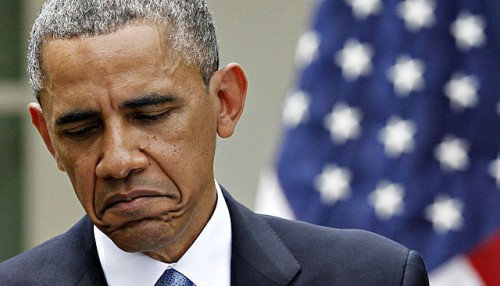
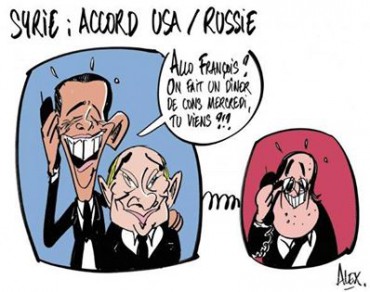
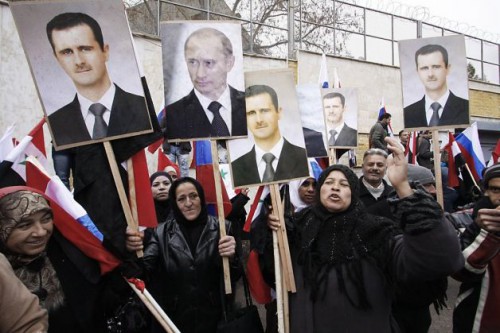

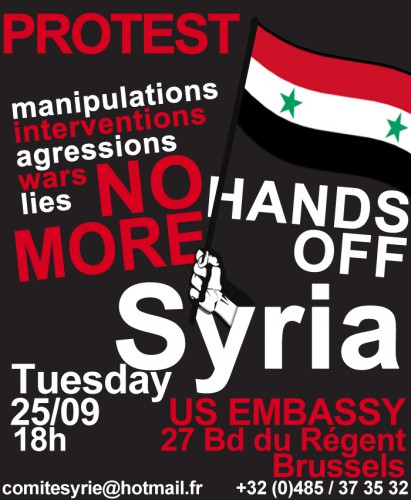





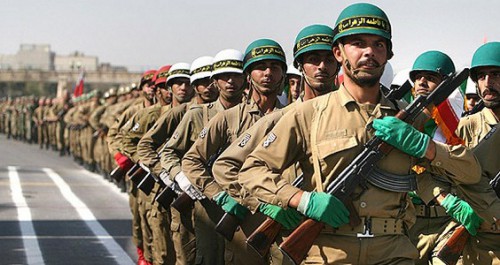
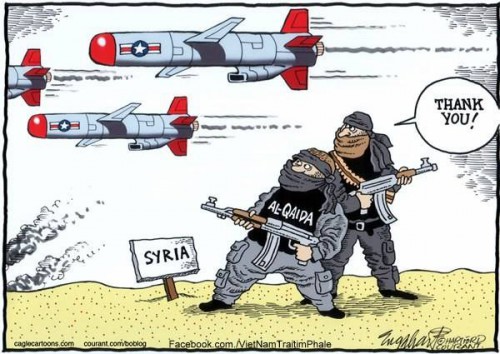
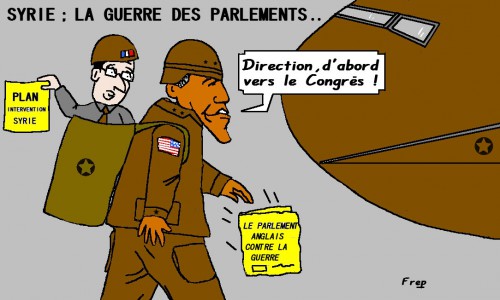
 La politique du gouvernement actuel de la France à l’égard de la Syrie est le prototype même de la confusion, de l’imprudence et d’une absence totale de bon sens.
La politique du gouvernement actuel de la France à l’égard de la Syrie est le prototype même de la confusion, de l’imprudence et d’une absence totale de bon sens.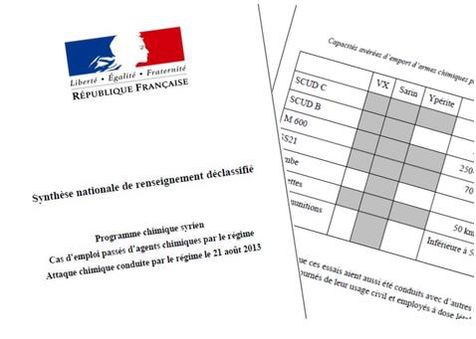
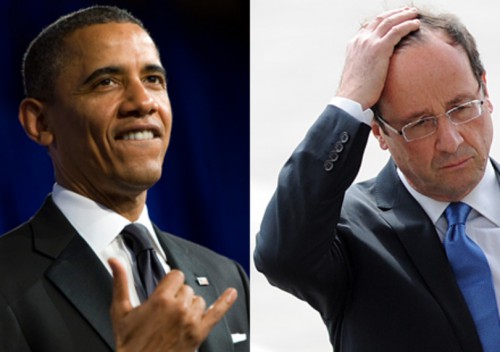
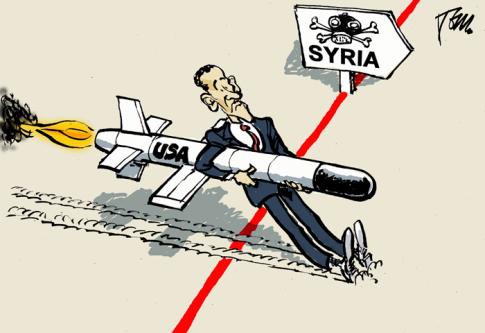
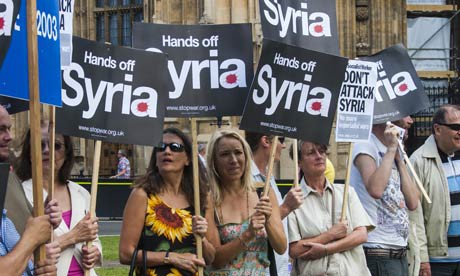
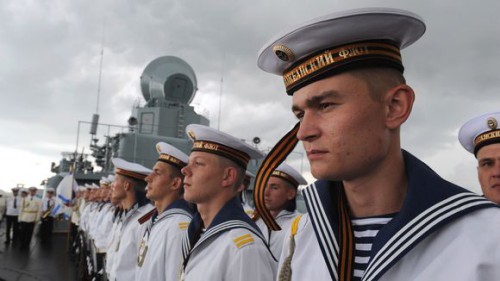
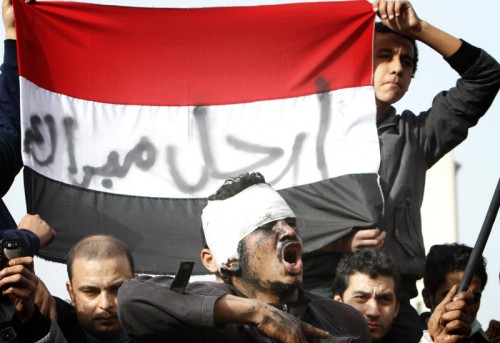

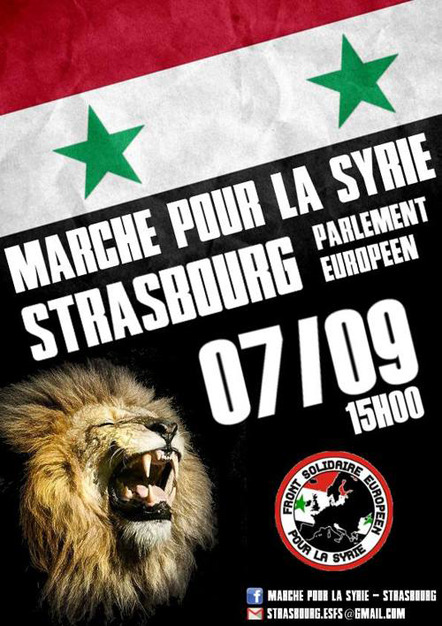
 Interview.
Interview. 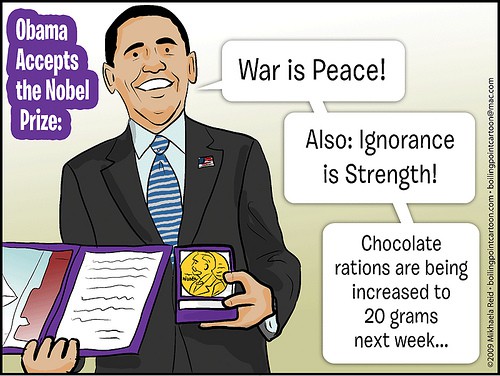
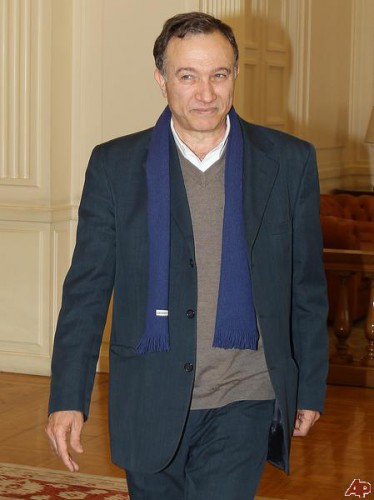 L’utilisation d’armes chimiques en Syrie pourrait amener les Occidentaux à "punir" le régime. Qu’en pensez-vous ?
L’utilisation d’armes chimiques en Syrie pourrait amener les Occidentaux à "punir" le régime. Qu’en pensez-vous ?